





























PUBLISHING
David Nivens, Publisher david@comocompanies.com
Chris Harrison, Associate Publisher chris@comocompanies.com
EDITORIAL
Jodie Jackson Jr, Editor jodie@comocompanies.com
Kelsey Winkeljohn, Associate Editor kelsey@comocompanies.com
Karen Pasley, Contributing Copyeditor
DESIGN
Jordan Watts, Senior Designer jordan@comocompanies.com
MARKETING
Charles Bruce, Director of Client Relations charles@comocompanies.com
Kerrie Bloss, Account Executive kerrie@comocompanies.com
CONTRIBUTING PHOTOGRAPHERS
Keith Borgmeyer, Charles Bruce III, Jodie Jackson Jr, Anthony Jinson, Abigail Wade – Columbia College
CONTRIBUTING WRITERS
Lauren Sable Freiman, Jodie Jackson Jr, Brandon Knight, Matt McCormick, Julia Myers, David Nivens, Steve Spellman, Brian Toohey, Kelsey Winkeljohn
SUBSCRIPTIONS
Magazines are $5 an issue. Subscription rate is $54 for 12 issues for one year or $89 for 24 issues for two years. Subscribe at comobusinesstimes.com or by phone. COMO Business Times is published monthly by e COMO Companies.
OUR MISSION STATEMENT
COMO Business Times and comobusinesstimes.com strive to be Columbia’s leading source for timely and comprehensive news coverage of the local business community. is publication is dedicated to being the most relevant and useful vehicle for the exchange of information and ideas among Columbia’s business professionals.
Copyright e COMO Companies, 2025
All rights reserved. Reproduction or use of any editorial or graphic content without the express written permission of the publisher is prohibited.
FEEDBACK
or a
If at first you don’t succeed … then maybe skydiving isn’t for you.
Perhaps you’ve had a good laugh about that phrase, or maybe the metaphorical application of the skydiving fail has set you up for something far worse than failure: not trying.
The pages of this issue of COMO Business Times introduce readers to the 20 Under 40 Class of 2025 with mini profiles that, hopefully, encapsulate the driving passions and character of our twenty award recipients. Along with our CBT and COMO Magazine advisory boards, our staff initially whittled down a record-breaking list of nominees to a Top 40 list of finalists. At that point in the process, those forty were asked to provide written answers to a series of questions about their professional careers, educational endeavors, personal goals, and life journeys.
When those responses were assembled, our reimagined selection process included a five-member ad hoc committee, our advisory board members, and our staff scoring the finalists, giving us twenty nominees who stood out as the cream of the crop. There was no public vote and no lobbying friends and neighbors for support.
It wasn’t a popularity contest.
So what about that skydiving metaphor? As a writer and editor who is full of writing and editing angst — or, for that matter, as a husband, father, friend, etc. who is full of angst about whether I fill any of those roles with any degree of success — I am painfully aware of imposter syndrome. Most of us are familiar with the illustration showing a little angel on one shoulder and a little devil on the other shoulder, and their voices compete for our attention.
In my case, I have a little imposter syndrome guy on my right shoulder and a Big Imposter Syndrome Guy on my left shoulder. The former is passive-aggressive …
“Hey, you can try, but, really, why bother?” and the latter is just flat-out hateful … “You’re a fraud, and you haven’t fooled anyone. Everyone knows.” Those are my competing voices, spilling automatic negative thoughts (or, ANTs) into my noggin.
ANTs. They sure do suck (the life and energy out of great ideas, hopes, and dreams). Reading through the incredibly insightful and sometimes raw responses of our 20 Under 40 awardees was a helpful exercise in seeing how others have succeeded, overcome, and problem-solved to become shining examples for their businesses, co-workers, employers/employees, families, and community. Collectively, they represent a force that the rest of us can harness to fight the ANTs.
One common denominator — whether they articulated it exactly like this or not — is the pushback against the voice or thought that says, “You just can’t do that.” The pushback? “Just watch me.”
Some of the other common denominators that our 20 Under 40 class demonstrate was having great mentors, giving themselves permission to fail, surrounding themselves with others who have the “just watch me” attitude, and, essentially, learning that the best way to eat an elephant is one bite at a time.
When you’re in that kind of company, you can stomp ANTs together.
What are the ANTs that pester you? How do you handle imposter syndrome? Gain some inspiration from the 20 Under 40 Class of 2025, then please consider letting me know how you answer those questions.

JODIE JACKSON JR EDITOR
One common denominator — whether they articulated it exactly like this or not — is the pushback against the voice or thought that says, “You just can’t do that.” The pushback? “Just watch me.”

The 20 Under 40 Class of 2025 takes the stage. These individuals will be honored in an event at The Blue Note on Wednesday, October 8.
Photo by Anthony Jinson

CBT’s advisory board is made up of industry leaders and small business owners who help ensure CBT’s content is relevant to our local business community.







Shawn





Drew


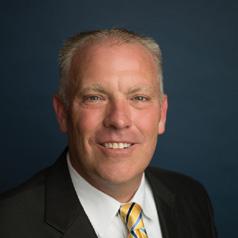
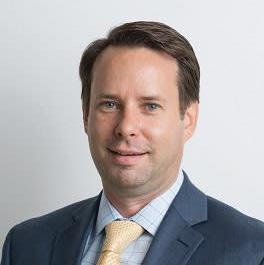
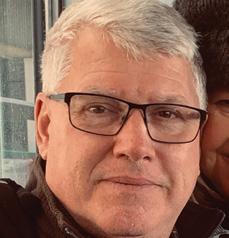
Jay
As summer ends, we are heading into my favorite time of year. Fall marks the beginning of another school year, the start of football season, cooler temperatures, vibrant colors, and now our “20 Under 40.” We are delighted to welcome you to our September 2025 issue of COMO Business Times. This month, we shine a spotlight on an extraordinary group of young leaders — our 20 Under 40 Class of 2025 — who are shaping the future of business and community in dynamic and meaningful ways.
Each year, the 20 Under 40 award celebrates outstanding professionals under forty who demonstrate leadership, innovation, and civic engagement in Columbia. The selection process is nothing short of rigorous: Candidates are nominated by the community, evaluated by a diverse panel of judges drawn from both industry and civic sectors, and assessed across professional achievements, leadership potential, and measurable contributions to the greater good. This year’s cohort emerged as a standout group — from emerging entrepreneurs to rising executives — each distinguished by ambitious vision and tangible community impact.
In this issue, you’ll meet honorees who are building businesses that create jobs and nurture local economic growth, alongside those who volunteer tirelessly, expanding access to education, championing environmental sustainability, or forging partnerships that strengthen our community.
Complementing our celebration of rising talent, we are proud to introduce a feature on the Aspire Business Clinic at Columbia College’s Robert W. Plaster School of Business. This unique experiential learning hub immerses students in real-world consulting projects — transforming classroom theories into strategic business solutions. Modeled after a bona fide consulting firm, the clinic empowers students to collaborate with clients — small businesses and nonprofits — on marketing plans, communications strategies, social media, and broader strategic planning.
In many ways, the ethos of the Aspire Business Clinic echoes that of our “20 Under 40” honorees: bridging ambition with action, education with impact, and innovation with service. As we showcase these remarkable individuals this month, we also invite our readers — employers, entrepreneurs, educators, and community members — to consider how engagement and opportunity fuel growth at every level.
On behalf of the entire team at COMO Business Times, I extend hearty congratulations to our 20 Under 40 Class of 2025 honorees. Thank you for your leadership, for pushing the boundaries of possibility, and for investing in our community.
Here’s to a September full of potential, purpose, progress, and Mizzou football!
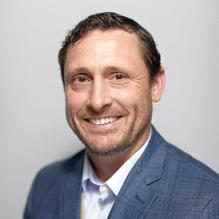
DAVID NIVENS PUBLISHER david@comocompanies.com
The selection process is nothing short of rigorous: candidates are nominated by the community, evaluated by a diverse panel of judges drawn from both industry and civic sectors, and assessed across professional achievements, leadership potential, and measurable contributions to the greater good.



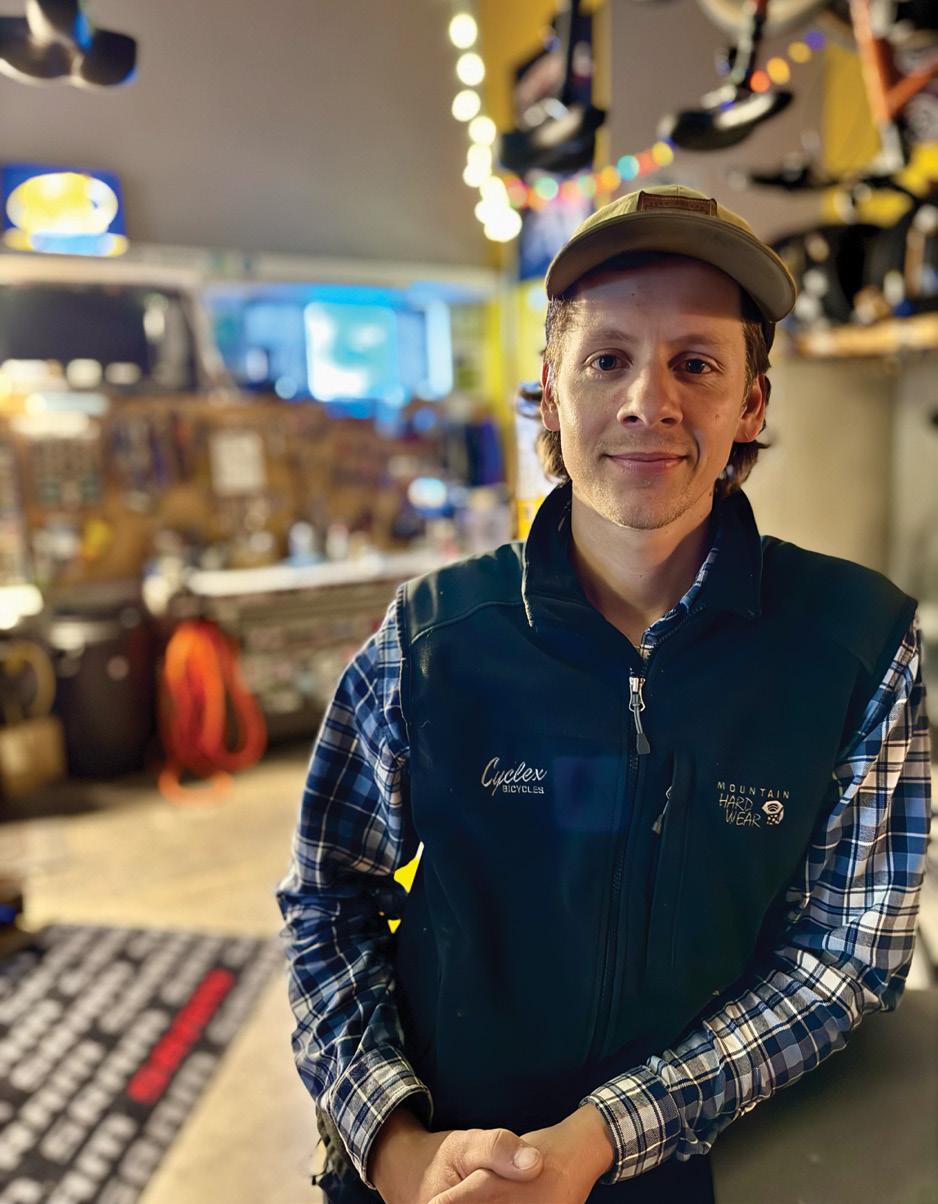

In 2025, Brian Kukla purchased Tryathletics, a company that had been around since 1986. Before owning Tryathletics, Kukla also owned CycleX, which he bought in 2018. Both shops are known for selling bike gear; however, Tryathletics also serves swimmers, runners, and anyone else looking to move their body.
“Both of the shops are set up to help people of all skill and experience levels,” Kukla explained. “It doesn’t matter if you are a rst-time cyclist/ runner/swimmer or an elite athlete. We are here to help you.”
After being into bikes since middle school, Kukla appreciates the mechanics of the bicycle, while also loving what they can do for the people they serve.
“ e bicycle can do so much for people. I use it for sport, leisure, recreation, tness, commuting, and mental health,” he said. “I want as many people to experience that as possible.”
Getting into a new tness hobby can be challenging, especially without support from others. Kukla hopes to bridge that gap and to bring more people into the cardio-community.
“At both shops, we are here to help facilitate connections through movement,” he said. “ at can be connections with ourselves, our friends, our community, the earth, and so much more.”
1605 Chapel Hill Rd Suite A | 573-447-2453 | Tryathletics.com
CycleX: 203 N Providence Rd Suite 103 | 573-874-7044 | Cyclex.com
If your eyebrows need some TLC, you might consider stepping into Smooth Secret Studio. Audrey Paglusch has been trying to beautify her community since opening the studio in the summer of 2021.
Whether it’s through eyebrows, waxing, lip blushing, micro blading, and similar services, Paglusch is hoping to make others feel con dent in their appearance.
“I quickly fell in love with making others feel better in their own skin and seeing the reactions to the transformations,” she said. “I knew it was what I wanted to do full-time, and I became sick of working for the corporate world.”
Paglusch also serves the community in other ways. Whenever possible, she supports local makers, hosts inclusive events, and provides self-care education to clients. Since opening, she has been able to provide an inclusive space for others.
“My business brings a sense of belonging, con dence, and care to the community,” she said. “I’ve created a space where clients feel safe, seen, and prioritized — no matter their background.”
914 N. College Ave, Suite 4, Columbia, MO 65201 (573) 970-2429 | smoothsecretstudio.glossgenius.com CBT
– HOUSE OF BROKERS
House of Brokers and Weichert Realtors First Tier have merged, combining House of Brokers Realtors’ deep community roots with Weichert’s national reach and relocation network. The newly formed company remains locally owned and operated.
RYANN KAMPETER
Mid America Bank has announced the hiring of Ryann Kampeter as assistant vice president, director of marketing. She will be responsible for developing and executing strategic marketing initiatives that enhance the bank’s brand, drive client acquisition, and foster revenue growth. Kampeter is a graduate of the University of Missouri. She was previously a local sales manager for ABC17 and Fox22.
Dr. Trent Haywood has stepped into a new fulltime role as chief outcomes officer for Paytient, marking a significant expansion of the healthcare company’s leadership team. Haywood has been a longtime advisor for the company. His background includes serving as chief medical officer of the Blue Cross Blue Shield (BCBS) Association and president of the Blue Cross
Blue Shield Institute. Prior to that, he was the chief medical officer of Vizient and the deputy chief medical officer for the Centers for Medicare and Medicaid Services (CMS).
Ragtag Film Society, the nonprofit organization that operates True/False Film Fest, announced that filmmaker Yance Ford will assume the role of visiting artistic director for True/ False 2026. Ford has had an Oscar nomination and won a Primetime Emmy. The 23rd edition of True/False will take place March 5-8 in downtown Columbia.
Bethany James began her new role as director of operations for Boys & Girls Clubs of Columbia on August 4. James has more than a decade of experience in early childhood education and nonprofit leadership. She is a longtime club parent; her daughter has been part of its programs since kindergarten and is now in middle school. For the past eight years, James served as site manager for Jumpstart at the University of Missouri.
SCOTT ZIMMERMAN
Dr. Scott Zimmerman has been named as the new
director of Columbia College’s Steven and Barbara Fishman Center for Entrepreneurship. He began his new role on August 18 ahead of the 2025-26 academic year. The hiring was announced by Robert W. Plaster School of Business Dean Jonathon Moberly. Zimmerman most recently served as chair of the Undergraduate Business Administration Program at William Woods University in Fulton. He is a 28-year veteran of the U.S. Army and Missouri Army National Guard.
Central Bank of Boone County (CBBC) has promoted Garrie Morris to consumer banking officer. Morris will be responsible for ensuring branches receive an adequate supply of currency. He has been in financial services for more than six years and most recently was the commercial services branch manager.
Jhameikka Nunnelly has been promoted to CBBC consumer banking officer. She will be responsible for coaching and developing her team while strengthening their overall sales performance and customer engagement. Nunnelly has been in financial services for more than five years and most recently was the Lake of the Woods branch manager. CBT

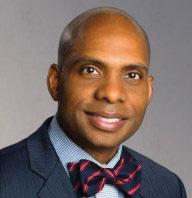

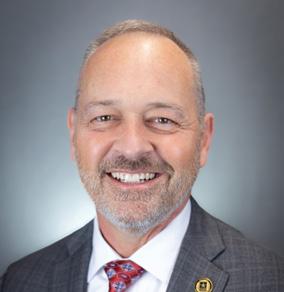
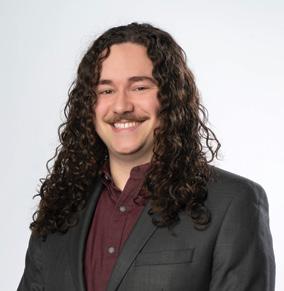

Are you or your employees moving up in the Columbia business community? Send us your news at jodie@comocompanies.com

Logboat has achieved statewide distribution.
BY JODIE JACKSON JR
PHOTO BY KEITH BORGMEYER
(from the September 2018 issue of CBT )
ELEVEN YEARS AGO, when Tyson Hunt, Judson Ball, and Andrew Sharp opened Logboat Brewing Company at 504 Fay Street, the demand for their aromatic products quickly outpaced the volume they could supply.
As the brewery solidi ed its standing as a top option among Columbia’s breweries and bars — Logboat was the Columbia Chamber of Commerce Small Business of the Year in 2016 — the brewery also continued to expand its distribution footprint. When Logboat increased its physical footprint by 12,000 square feet in 2023, its beverages were being distributed in about sixty-six of the state’s 114 counties. Fast-forward to August 2025, and the
goal to have distribution avenues in all 114 counties has been realized, with nine wholesalers in the fold.
“Every year, it just seems there’s more opportunity for growth,” Hunt said, recalling the conundrum of trying to add “signi cant square footage” to its original site or nding a separate location for the brewery operation. But the thought of trying to manage separate facilities was eeting.
Instead, the Logboat team worked with their neighboring property owners and navigated some zoning issues to add the property needed for additional tank space, capacity, and equipment.
“ e last year and a half or so, it’s been a learning curve, for sure,” Hunt said, repeating the “we’re still learning” mantra that he has shared in past COMO Magazine and COMO Business Times interviews and articles. “It’s been a wild journey.”
To achieve the 114-county distribution goal, Hunt’s team worked with a former Anheuser-Busch engineer who helped
design some of that iconic brand’s spaces.
“He came in and improved what we had, but on a smaller scale,” Hunt said. During that process, other doors opened, and “before you know it, there’s a gauntlet of people who want to see you succeed.”
Hunt is also eager to pass along his knowledge and to mentor other local entrepreneurs as his time permits.
“I try to stay connected to that space, and share what I have learned,” he added. “I’m by no means an expert. I’m still learning myself.”
Hunt emphasized that “taking each ‘no’ as an opportunity to grow” as one item on his quick list of small business tips, which also includes:
• Have overwhelming passion for what you do, because you’re not only going to hear “no” a lot, but also “you’re crazy.”
• “When you own your own business, you always have to be available.” ere’s no o switch.
• Surround yourself with experts. “We’ve surrounded ourselves with brilliant people. en let them do their thing — it’s the reason you’ve brought them on board.”
• “If you can’t a ord an attorney and a good accountant, you should probably pump the brakes for a little bit.”
• Allow yourself to fail. “ ere have been things we’ve gotten wrong and things we’ve gotten right.”
• “Pay attention to what’s happening around you and get out of your bubble.”
• “ ere’s always competition.”
• And nally: Be accountable to your team and to your customers.
e Logboat ownership team celebrated the fth anniversary of Waves Cider Company at 604 Nebraska Avenue in early August, and they continue to develop an orchard to gure out which apples grow best in Missouri’s unpredictable climate. And with distribution channels in place, Hunt said it seems to be the right time to start “dabbling in non-alcoholic, better-for-you drinks.”




Looking back at the “wild ride,” Hunt seems to just smile and shake his head, almost in disbelief.
“Eleven years ago, we all had day jobs,” he said. “We were three buddies who were in a band together, and we started brewing beer in my garage.”
Hunt paused. “Columbia’s been an incredible place to do business. It’s been a wonderful eleven years.” CBT

BY BRIAN TOOHEY
THIS YEAR, THE CITY OF COLUMBIA is considering updating the local building code from the 2021 version to the 2024 International Building Code. Part of that decision will include adopting the 2024 International Energy Conservation Code (Energy Code), which is designed to enhance energy e ciency standards. e City Council will make this decision based on recommendations from the Building Codes Commission and the Climate and Environment Commission, which oversee the city’s Climate Adaptation and Action Plan (CAAP).
In 2021, the city delayed implementing the Energy Code, citing higher costs, inventory shortages, and skilled labor issues. Now, three years later and still facing a housing crisis, the city should consider delaying the implementation of the Energy Code again.
e median price of a single-family home in Columbia hit another record — $375,000 — in June, and home appreciation shows no signs of slowing. Condo prices are also near all-time highs. A shortage of available homes to meet market demand fueled by population growth continues to drive prices higher, especially when 30-year xed-rate mortgages dip below 7 percent. New code requirements will only increase the cost of owning and renting homes in Columbia, with some local estimates suggesting a $10,000 to $15,000 rise in construction costs for a single-family home with a 20- to 30-year payback time frame.
In the past, the city was able to implement and exclude parts of national building codes as recommended by our local commissions. Today many new homes are built with performance path compliance, using

energy modeling software through building consultants to ensure a new home meets energy standards. Because of the software used for analysis, the city can no longer selectively approve parts of the code. It must either adopt the entire energy code as it is or not at all, ensuring the software used by the consultants accurately conforms to the energy code requirements.
Other parts of the country facing a ordable housing issues are postponing the adoption of new building codes to help improve rental and homeownership a ordability. Most notably, California Gov. Gavin Newsom recently signed a bill into law that freezes residential building standards, with some exceptions, through 2031. e law also bans local municipalities from updating their building codes during this period.
is same approach could help local a ordability or at least slow the rate of home appreciation Columbia has experienced since 2013, a period in which the median price has risen by 115 percent.
Early adoption of building codes may seem sensible, but it can lead to unexpected issues. Code creation has political implications, as manufacturers lobby for require-
ments that would boost their sales. Several requirements in the 2021 Energy Code were eliminated in the 2024 Energy Code. By postponing adoption of new codes, builders won’t be required to install technological components (e.g., solar connections) during construction that won’t be used for years and may therefore need upgrades later.
I fully support energy e ciency and have invested a lot of time and money to make my 20-year-old home as e cient as possible and reduce my family’s carbon footprint. However, delaying the adoption of the 2024 Energy Code makes sense to help ease Columbia’s a ordable housing crisis. A delay could help prevent further increases in construction costs, which are already rising due to economic issues, in addition to forthcoming significant increases in utility rates. It could also help avoid unintended consequences from adopting code items that don’t actually improve energy e ciency. Columbia should wait at least a year before adopting the new code to see how updates in the Energy Code are a ecting housing costs elsewhere before making any more changes. CBT

BY MATT M C CORMICK
WHEN WE TALK ABOUT THE FUTURE of our community, we often look to our young professionals — our up-and-coming leaders, entrepreneurs, and change-makers.
ey’re full of ideas, ambition, and a fresh approach to doing business. But in the last few years, one theme has been emerging strongly among this group: burnout.
We’ve all heard of burnout: emotional exhaustion, disengagement from work, and a decline in performance. For many young professionals in Columbia and across the country, the burnout struggle is very real, and we need to pay attention.
Workplace burnout used to be considered something that happened after decades of grinding through a career. Now, it’s increasingly a ecting people in their 20s and 30s. According to a 2023 Gallup survey, nearly 44 percent of millennials and Gen Z employees reported feeling burned out “very often” or “always” at work. at’s nearly half of an entire generation of our workforce.
What’s causing this? For starters, the post-pandemic workplace is still evolving. e pressure to “hustle” remains strong, with long hours, blurred work-life boundaries, and the feeling of always needing to do more to prove oneself. Add in student debt, economic uncertainty, and limited opportunities for mentorship, and it’s no wonder our emerging professionals are overwhelmed.
systems, they’re at risk of burning out before they ever reach their prime. at’s not just a personal issue, it’s a community issue. Our economic vitality depends on a thriving, engaged, and supported workforce.
at’s one reason why the Columbia Chamber of Commerce has made it a priority to create space and structure for young professionals to grow, connect, and recharge.
Our Emerging Professionals in Columbia program was designed with this very need in mind. EPIC isn’t just a networking group. It’s a community, a resource hub, and a launching pad for future leaders. rough regular events, professional development sessions, and volunteer opportunities, EPIC gives young professionals a way to build relationships, gain mentorship, and stay inspired in their careers. Whether it’s a lunch-and-learn on personal nance, a panel on mental wellness in the workplace, or a community service day with fellow members, EPIC o ers more than just a resume boost — it o ers real connection.
Burnout doesn’t disappear overnight, but there are strategies that can help. Here are a few tips we’ve seen resonate with our EPIC members and young professionals:
who’s been in your shoes can provide clarity, encouragement, and perspective.
• Unplug regularly. Disconnecting from email and social media, especially outside of work hours, can reduce the feeling of being constantly “on.”
• Do something meaningful. Volunteering or engaging in community work can reignite your passion and give your e orts a greater sense of purpose.
• Ask for help. Whether it’s talking to a supervisor about workload or seeking mental health support, reaching out is a sign of strength — not weakness.
Supporting our young workforce isn’t just the Chamber’s job — it’s something every business and leader in Columbia can be part of.
Employers, I encourage you to check in with your young team members. Are they feeling engaged and challenged in the right ways? Do they know their work matters? Do they have access to mentorship or peer support? And most importantly, do they have the space to disconnect and recharge?
AND OPPORTUNITY
Here in Columbia, we’re seeing this dynamic rsthand. Many of our young professionals are entering the workforce full of passion and potential. But without the right support
• Set clear boundaries. Whether it’s logging o at a set time or saying “no” to nonessential tasks, protecting personal time is critical.
• Find a mentor. Talking to someone
Creating a culture of wellness doesn’t mean sacri cing productivity. In fact, the opposite is true. When employees are cared for, they perform better. ey stay longer. ey lead more boldly. And when young professionals thrive, so does Columbia. CBT

BY JULIA MYERS, MYERS, PHARM. D., MBA; FOUNDER OF GENERATIONAL WISDOM
MONEY IS AN INTEGRAL PART of our lives, yet it remains one of the last taboos in many families. As parents, we are comfortable talking about school, career ambitions, and family vacation plans, but nancial discussions are often avoided.
According to a T. Rowe Price survey in 2021, “83 percent of parents with children under the age of 18 believe it is important to teach their kids about money, but only 4 in 10 parents (41 percent) have regular money conversations with their children.” Avoiding money talks creates a gap in our children’s knowledge, con dence, and ability to successfully enter and navigate adulthood.
A 2022 study from NFEC determined that “only 24 percent of young adults feel very con dent in their ability to manage their nances.” In an age where nancial security feels more tenuous than ever, normalizing money conversations is essential — not just for today, but to empower the next generation with the tools they need for the future.
THE IMPACT OF SILENCE: WHY PARENTS AVOID MONEY
Many parents shy away from discussing nances for several reasons. Some worry that such talks might burden children with adult concerns, while others feel unsure about their own nancial knowledge or have cultural or personal discomfort around the topic. Growing up, we always had just enough, and money was something we carefully managed but rarely discussed openly. at experience left me feeling cautious and uncertain about nances.

Only 24 percent of young adults feel very confident in their ability to manage their finances.
Now, as a parent, I want my kids to feel secure and con dent with money, understanding it as a tool rather than an emotional topic. In my work, I nd that family is the strongest source of money in uence on a person and signi cantly shapes each person’s unique money story. As parents, we have the opportunity to shape the next generation’s story about money, but it cannot be done without regular, healthy money conversations.
When we avoid money conversations, we leave children to form their own, often misguided, beliefs about money, which can in uence their future nancial decisions and sense of security.
Yet, it doesn’t have to be this way. We don’t need to dive into the stock market or reveal every nancial detail to our kids; instead, we can start small by focusing on principles, healthy money habits, and values-driven decision making.
Introducing nancial topics early — and as a normal part of family life — can instill con dence, curiosity, and a sense of responsibility. Here are three essential money questions that can spark meaningful, age-appropriate conversations with your kids.
It may sound simple, but de ning what money really is — both practically and philosophically — can shape a child’s understanding for years to come. Explain
that money is a tool for exchange, similar to a unit of time or energy. Money can be earned, saved, or spent. Just like time and attention, it is a valuable resource to be treated wisely. Help them understand that money itself isn’t “good” or “bad;” it’s simply a means to an end. is clarity fosters a healthy, balanced attitude toward wealth and spending, free from guilt or attachment. For the older kids, talk about physical money as the “cost” where the “price” is an intangible value assigned by each individual person.
Many children only see money as something that appears from the Bank of Mom and Dad or with a swipe of a card. Money actually comes from hard work! Help them understand that money is earned through value creation — by working, solving problems, or o ering services. Share examples from your work or family contributions, and let kids share ideas for how they would like to earn money. What problem would they solve? Talk with older children about the power of compound interest and that saving and working are not the only ways to earn more money.
One of the most powerful lessons you can teach is that money is a tool for achieving goals. It is a necessary part of life and for providing the needs and wants. Kids of all ages should be able to recite that money is for saving, spending, and sharing. Younger kids understand how time is managed ( ve minutes until your screen time is up), and I encourage parents to talk about money in relation to speci c events, such as pay day and when bills are due. For older kids, walk them through not only the “what” of a nancial decision, but also the “why.” For example, explain why you save for vacations or support local causes instead of buying the latest electronics. is insight instills
a sense of purpose around wealth and reminds children that money should align with values, not just desires.
When we openly talk about money, we build a legacy of trust, transparency, and con dence. Financial conversations don’t have to be burdensome or one-sided; they can be curious, collaborative, and even fun. Imagine the bene ts of children who grow up with a balanced understanding of nances — they are more likely to make sound nancial choices, feel empowered to ask questions, and contribute to their own nancial security and well-being as adults.
You have the power and the responsibility to break the generational money story. As parents, we want the absolute best for our kids and often justify overworking or oversaving in the name of “doing it for the kids.” Unfortunately, without the wisdom to manage wealth, passing on an inheritance is like playing the lottery. You are leaving your legacy to chance.
Generational wealth without wisdom is like playing the lottery. Don’t leave your legacy to chance.
e statistics speak for themselves: Nearly 70 percent of wealth is lost within one generation and 90 percent by the second. ese numbers re ect the dangers of a nancial culture that focuses on secrecy and avoidance over openness and education. By normalizing money conversations at home, we empower our children to be wise, con dent, and discerning custodians of their own — and our — nancial legacy.
Let’s break the silence around money, not just for the nancial literacy of our children, but for the lasting legacy of our families. Start small, encourage curiosity, and share your experiences. Talking about money isn’t just about dollars and cents; it’s about building a foundation of trust, wisdom, and resilience for the next generation.
What will be your family’s rst money conversation? CBT

For the past 75 years, Nabholz has supported our people every day. Our extensive training and development programs — from youth apprenticeships to leadership development to tuition reimbursement — ensure our employees can continuously advance their career.


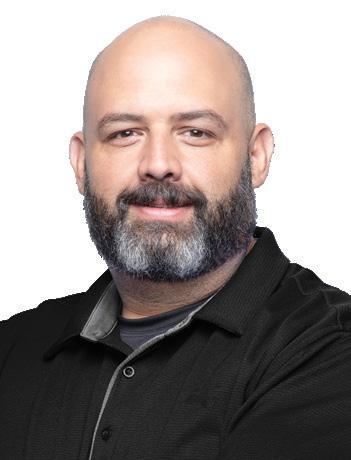
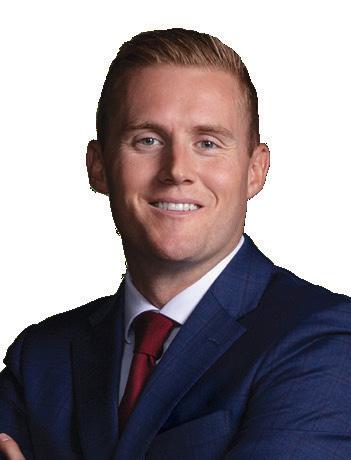


By Charles Bruce III charles@comocompanies.com
In a world of scrolling thumbs and shrinking attention spans, short-form video has emerged as one of the most powerful tools in digital marketing. Platforms like TikTok, Instagram Reels, and YouTube Shorts have reshaped the way people consume content—and the way businesses reach their audiences.
But short-form videos aren’t just for dance trends or viral challenges. When used strategically, it can drive real business growth by boosting brand awareness, engaging followers, and converting viewers into customers. Here’s how to make shortform video work for your business, no matter your industry or size.
1. Start with a Clear Goal
Before you hit “record,” decide what you want to accomplish. Are you trying to:
• Grow your audience?
• Educate your followers?
• Drive traffic to your website?
• Promote a product or service?
Your goal will determine the tone, format, and call-to-action of your video. For example, if your goal is education, a quick how-to or tip series might be ideal. If you’re promoting a sale, a behind-the-scenes look at your product in action could drive urgency.
2. Hook Viewers in the First 3 Seconds
The scroll is real. To stop thumbs in their tracks, you need a strong hook—right away. Ask a question, show a surprising visual, make a bold statement, or tease what’s coming next.

Examples of great hooks:
• “Most people don’t know this marketing trick…”
• [Shows dramatic before-and-after of a home renovation]
• “Three things I wish I knew before opening my business…”
CHARLES BRUCE III Director of Client Relations
Charles Bruce is the Director of Client Relations for COMO Companies which owns COMO Marketing, COMO Magazine, and COMO Business Times. He received his Bachelor’s Degree in Business Administration and his MBA from the University of Dubuque. When Charles isn’t being the life of the party, he can be found climbing a large mountain. In December 2023 he climbed the Imja Tse mountain in Nepal.
573-577-1965 | comomarketing.co

A strong start is essential to keep viewers watching until the end—and engaging with your content.
3. Keep It Short, Sweet, and Focused
Short-form videos typically run under 60 seconds — and often perform best in the 15–30 second range. That means every second counts.
Stick to one clear message or idea per video. Trying to say too much will confuse your audience and dilute your impact. If you have more to share, create a series instead of packing everything into one post.
4. Show, Don’t Just Tell Visual storytelling is what makes videos
so engaging. Use it to your advantage! Demonstrate your product, show behindthe-scenes action, feature real customers, or create quick tutorials.
Instead of saying “We’re a trusted remodeling company,” show clips of your team working, happy clients walking through their renovated spaces, or a timelapse of a project coming together.
People remember what they see more than what they hear — so make your visuals count.
Scan the QR code to find more short-form video strategies on our blog.

By Brad Roling broling@midambk.com
We have welcomed a few new, friendly faces into the Columbia branch, and I’d like for you to get to know them too. Let’s hear from Brandon Kalista, AVP, Loan Officer.
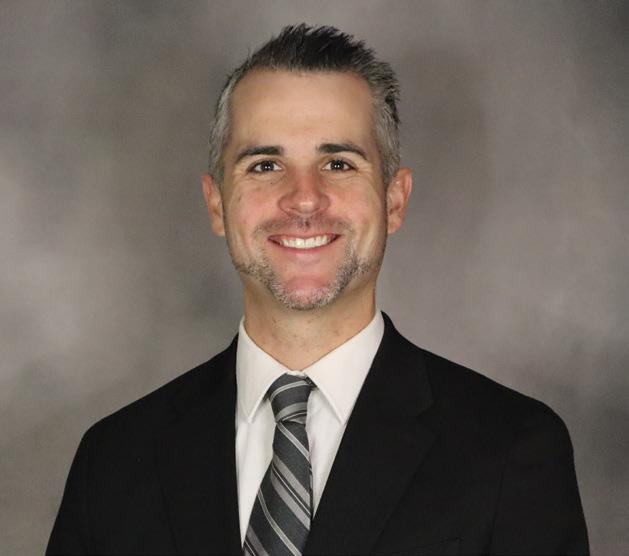
Hi, I’m Brandon Kalista! I joined Mid America Bank at the beginning of 2025 and am excited to be a part of an organization that is committed to excellent service and invested in their local communities. I have been in banking for 14 years and in central Missouri for 12 of those years. I love spending time with my family, being involved with my local church, and getting out for an afternoon of golf.
What do you enjoy most about banking? I enjoy playing a small part in the development of our local communities. Whether a community

member is coming to me for a construction loan to build their dream home or a local entrepreneur is ready to start their business, I am honored to walk them through the financing process.
Do you remember making your very first loan? I’ve had two kids and a lot of sleepless nights since then, but what I do recall is the excitement. There is a lasting sense of pride when I help a client reach a goal, whether it be securing financing for personal reasons or professional reasons. That feeling never gets old.
If you could tell prospective clients one thing, what would it be? Be proactive when opportunities come your way. Investment opportunities involve taking calculated risks, so it’s never too early to start asking questions and engaging resources in the community. The team and I in Columbia are from the area and have connections to help you make informed decisions.


573-998-8900 | midambk.com BRAD
Brad Roling is the Columbia Market President for Mid America Bank. Brad has more than 10 years of banking experience that he uses to help businesses in and around Columbia thrive. When he is not helping your business with its financial needs, Brad is serving the community in a variety of capacities. He is proud to serve on the Ronald McDonald House Mid-Missouri Board of Directors as Treasurer, the Columbia Chamber Foundation Board as Treasurer, Heart of Missouri United Way Board of Directors, Executive Board for Scouting America, Great Rivers Council, and Beta Theta Pi

What does a typical day at work look like for you? A typical morning starts with getting a fresh cup of coffee and then checking on our team. I review a few emails that may have come in the previous day or evening to make sure I stay on top of communication with clients. From there, the day can go in any direction with client meetings, construction inspections, site visits, or phone calls; every day is a little different, which is one of my favorite things about my job as a loan officer.
If you could instantly master any skill outside of finance, what would it be? Handyman work – being able to have the knowledge and ability to complete most of the tasks around the house would be an incredible skill to have. This is one you can pass on to your children and is very useful for everyday life.



By Vaughn Prost info@prostbuilders.com
President Trump’s “One Big Beautiful Bill,” signed July 4, 2025, eliminates the 30% Residential Clean Energy Credit for solar systems installed after December 31, 2025. What was originally scheduled to phase out by 2034 under the Inflation Reduction Act (IRA) is now being cut nearly a decade early. Time is of the essence to take advantage of the generous 30% tax credit before the deadline.
With the 30% credit intact, an average $28,000 system would drop by $8,400.00. Once 2025 passes, these savings vanish— and homeowners face a 30% higher outof-pocket expense. This shift dramatically increases both the upfront cost and the payback period.
Don’t Wait!! Demand is Increasing
As December 31, 2025, draws closer, demand is increasing and consumers dreading their next electric rate hike will get solar before the new year. Installers are becoming overloaded, leading to project delays or higher prices. Experts warn a “rush-then-bust” pattern could occur— where many scramble to install in 2025, only to face a sharp slowdown in 2026.

VAUGHN PROST Owner & President
Vaughn Prost is the owner and president of Prost Builders lnc., a design/build and construction services firm located in Columbia. Vaughn has over forty years of domestic and international design and construction experience as a cost and scheduling engineer, structural engineer, owner’s construction representative, and general contractor.
(573) 635-0211 | prostbuilders.com 3305 Crawford Street Columbia, MO 65203
Halting the credit abruptly could cost up to 300,000 U.S. clean energy jobs, slash $220 billion in expected solar and storage investment, and jeopardize domestic solar manufacturing dominated by IRA-era growth. Without the credit, electricity costs may rise 18% nationally by 2035 due to slower renewable deployment.
Install and commission your system by Dec 31, 2025, to qualify for the full 30% tax credit.
Start consulting with Missouri Solar Applications now—solar projects can take months for permitting, equipment ordering, and grid interconnection. By acting now, homeowners stand to lock in thousands in savings, help reduce the burden on the electrical grid in the age of more demand for AI and digital computing, and hot summer peaks, plus you’ll enjoy a much faster return on investment.
Contact us at (573)496-8685 or info@ mosolarapps.com to set up a no-pressure solar assessment. Visit mosolarapps.com for more information.

Solar design options: ground mounts, rooftops, car shade structures, field arrays, sun trackers, etc.
By Will Scheperle
In today’s fast-paced business environment, your organization’s IT infrastructure is more than just a set of servers and networks – it’s the backbone of your digital health. Just like our own physical well-being, IT systems require regular check-ups, a balanced diet of updates, and a solid exercise routine to remain strong, secure, and adaptable. Consider this: your IT infrastructure is like the heart of your business, pumping data and enabling communication, collaboration, and customer service. But like any vital system, neglect can lead to serious consequences. System failures, security breaches, and inefficiencies can feel like the IT equivalent of heart disease or burnout. That’s why maintaining the health of your IT infrastructure is not just a matter of convenience – it’s a matter of business survival.
Much like how we nourish our bodies with good food, IT infrastructure needs to be consistently updated and optimized. This means regular software patches, hardware upgrades, and security enhancements. A balanced digital diet will keep your network performing at its peak, while reducing vulnerabilities and the risk of downtime.
GFI Digital is modernizing the way we take care of your IT Infrastructure with the introduction of Kaseya365.

Experience the convenience of a single platform that addresses all your IT requirements, eliminating the need for multiple tools and reducing complexity.
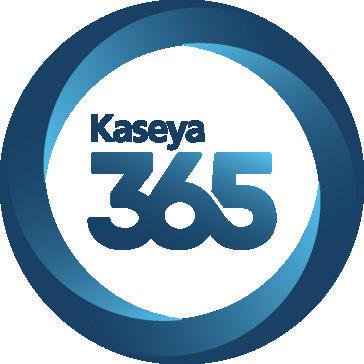

croofe@gfidigital.com

Eliminate Wasted Effort and
Streamline your operations with automated processes and integrated solutions, allowing your team to focus on more strategic tasks.
Benefit from solutions designed with your specific needs in mind, ensuring that every feature and function adds value to your business.
Kaseya 365 Endpoint
Enjoy comprehensive endpoint protection with remote monitoring and management, patch management, antivirus, endpoint detection and response, ransomware detection, endpoint backups, and managed detection and response.
Kaseya 365 User
Protect your users with advanced security features including anti-phishing, security awareness training, dark web monitoring, cloud detection and response, and SaaS backup and recovery.
Kaseya 365 Ops
Optimize your IT operations with tools for documentation, service automation, quoting and procurement, network discovery and password rotation, IT collaboration, and quarterly business reviews (QBRs) and reports.
By prioritizing the health of your IT infrastructure, you’re not just preventing problems — you’re fostering a robust, thriving ecosystem that will keep your business running efficiently for years to come.



A record-setting 195 nominations and three rounds of rankings later — plus some energetic planning for an upcoming epic celebration at The Blue Note — and the 20 Under 40 Class of 2025 is ready for prime time.
The new honorees come from myriad professions, backgrounds, and experiences. The persona of the 2025 honorees is someone who is resilient, has a voracious appetite to keep learning, is a community collaborator and a work-until-your-dream-comes-true type of personality, and a person who exemplifies the best in an employer or an employee.
The 20 Under 40 honor selection process is not a popularity contest; there’s not a public vote or an online polling system that solicits multiple votes. The process included numbered rankings from COMO Companies staff, members of the COMO Magazine and COMO Business Times advisory boards, and a special ad hoc committee made up of seasoned Columbia business executives. The ad hoc committee was a new feature of the selection process this year as a transparent measure to affirm the credibility of the process.
In fact, the rankings by the ad hoc committee and advisory boards were weighted higher than COMO Companies staff rankings. The end result was a clear-cut list of twenty local individuals to make up the 20 Under 40 Class of 2025.

Members of the special ad hoc committee were:
• Randa Rawlins, retired CEO/ president of Shelter Insurance.
• Steve Smith, retired CEO of Job Point.
• Andrew Beverley, retired bank vice president, CEO, and board chairman.
• Bob Reid, retired insurance executive.
• Gary Thompson, retired president/ CEO of Columbia Insurance Group.



Each year, the 20 Under 40 class is honored at a ticketed celebration, and this year’s event is set for October 8 at the Blue Note. The 2025 celebration is more than an awards ceremony. It’s also a vibrant community networking event where guests can make connections and share inspiration. Doors open at 6 p.m., and the program begins at 7 p.m. There’s a cash bar and musical entertainment by Soul Root for the business casual event. Scan the QR code to buy your tickets before they sell out!




Director of Creative, American Outdoor Brands
Fun fact about Tony Galbreath Jr.: He nds it di cult to walk through a store without turning it into a master class in design. He views the world as one vast creative classroom, analyzing the creative packaging of gum and explaining how a blinking countdown on an arcade game connects with consumer psychology.
“I probably drive my wife and kids a little crazy,” he says. “But when something truly catches my eye or heart, I stop and appreciate the craft behind it. Creativity is everywhere.”
As the creative director of American Outdoor Brands, Tony applies that same keen awareness and instinctive curiosity to every project. His approach emphasizes function over ash: He believes in creating designs that connect, captivate, and convert.
Tony’s creative journey began with an associate degree in mechanical drafting from State Tech, followed by dual studies in graphic design and photography at Columbia College. He joined American Outdoor Brands as a design intern over a decade ago. rough hands-on experience, determination, and self-teaching, he progressed into a leadership role that now encompasses branding, packaging, marketing, and merchandising across numerous brands.
His passion for making an impact is rooted in his upbringing, while his faith, friendships, and relentless pursuit of creative excellence continue to be an inspirational force on him.


Ashli Eaves has added “author” to her list of impressive credentials that includes twelve years of teaching experience and helping launch Aligned Wealth Group alongside a team of other nancial advisors. Getting the nancial advisory rm o the ground was energizing.
“It was a move I didn’t expect to make so early in my career,” she says, “but the opportunity to build something from the ground up, rooted in shared values and a client- rst mindset, was one I couldn’t pass up.” Ashli is also a bit surprised to earn a 20 Under 40 nomination — and to be selected as one of the twenty awardees.
“I never expected this,” she says. “It’s a reminder that showing up, doing the work, and leading with purpose can create real impact.”
Age:38
Ashli has also earned the Chartered Special Needs Consultant (ChSNC) designation, and her book, Special Needs, Special Plans, focuses on special needs nancial planning and builds on that work by o ering practical tools and encouragement for families in the special needs space.
“Publishing my book on special needs nancial planning was a key goal of mine and one I’m proud to have accomplished,” she adds. Ashli is also developing a series of workshops speci cally designed to help women feel more con dent and empowered around investing and nancial decision-making.
“In a male-dominated industry, it’s important to create space for women to ask questions, build nancial literacy, and take ownership of their nancial future on their terms and without intimidation,” she explains.
Banking is less about numbers and more about people for Garrett Walker.
In his role as assistant vice president and private banker at Simmons Bank, his focus is set on removing barriers, simplifying nancial lives, and building relationships that last well past a transaction. His days are rarely the same, and they can look anything like helping clients navigate life changes, connecting them with trusted professionals, or creating lending solutions that t their goals.
Garrett’s work ethic was apparent from a young age. At 14, he walked from Je erson Junior High to clean bathrooms downtown, later working in service jobs before starting his banking career at Landmark Bank (which later merged with Simmons Bank) in 2013. Over the years, he’s built a reputation for integrity, empathy, and community connection — qualities that earned him the Columbia Chamber of Commerce Emerging Professional of the Year award in 2024 and a seat on its board of directors.
“It has always been important for me to recognize and appreciate the advantages and opportunities I have had,” he says. “Following that, it is equally important to identify and work hard to overcome the disadvantages and setbacks as they arise.”
Outside of the bank, Garrett invests his time in causes that matter most to him, from serving as chair for EPIC (Emerging Professionals in Columbia) to supporting Blue Ridge Elementary through Simmons’ Partners in Education program.


Age:35
Half a lifetime ago, when she was 17, Samantha Boisclair auditioned for American Idol Despite having pneumonia.
“While I didn’t make it past the rst round of singing to the producers, I will never forget sitting in the stands at the old Qualcomm Stadium in San Diego, with thousands of people singing ‘California Dreamin’ by the Beach Boys,” she recalls. “De nitely a unique experience.”
Samantha owns Party Perfectly, a boutique party supply, balloon, and event planning business. She was the lead behind Shakespeare’s Pizza's ftieth birthday bash.
“ at was an absolute joy,” she says. Samantha is also the events manager for the Missouri Symphony (MOSY), which has led to some memorable moments. is season, for example, the symphony sold out two of its three performances.
“MOSY had not had a sold-out performance since pre-COVID,” she explains. “From guest entrance to exit, creating a memorable experience for the guest was key.”
Samantha learned event planning early on, noting that events at her house “were things of legend.” She was raised by two independent women with strong personalities, “both of them dramatically di erent, as much as a mother and daughter could be.” Her mother and her grandmother, Mimi, were driving forces in her development, teaching her to be independent, forward-thinking, and problem-solving.
“Taking the leap into small business ownership was absolutely terrifying but continues to be the greatest adventure,” she says.

Owner/Producer/Director, That’s What She Said Columbia
Age:37
Allie Teagarden’s work in Columbia is one year-round act of empowerment: on the stage, behind the scenes, and in the heart of the COMO community.
As the producer and director of the annual at’s What She Said Columbia production, she curates an unforgettable night that ampli es the voices of local women leaders where they share their stories of hardship and success — and as soon as the curtain drops, she begins building the next one.
Her in uence also extends beyond the spotlight. She collaborates on e Daily Blend with AC, helping bring in nonpro ts to share their mission. She also publishes a newsletter to more than 13,000 mid-Missourians with resources that inspire civic engagement and voter participation. In 2025, she completed the competitive LeadMO Sta Cohort Program, and earned her group the award for best campaign.
Allie is vice chair of the city of Columbia’s Human Services Commission and an active member of When She Votes, Boone County Democrats, and First Baptist Church, all of which strengthen the city’s civic and social fabric.
“I strive to work hard for my family and for my community,” she says. “I want to do all that I can to ensure my daughter and all children have a brighter future and live in a society that is just, equitable, kind, and hopeful.”

Development Director, Coyote Hill Foster Care Ministries; Owner and Tour Guide, Columbia Culinary Tours
“Jesus is Number 1 for sure,” says Joe Knight, the development director for Coyote Hill Foster Care Ministries. Joe also is the owner of and tour guide for Columbia Culinary Tours.
“My faith and relationship with God are what lead me to do what I do to help others thrive and live lives that are more full and engaging,” he explains.
Joe tips his cap to the mentorship of Marshall Robb, who saw Joe’s leadership skills “and gave me opportunities to learn.”
“It is part of why I still work with kids today,” Joe says. “He took this punk kid and helped me take the skills I had and put them onto a greater path than I was going.”
Joe also has a passion for connecting entrepreneurs to resources that would be helpful for their businesses to grow and be seen, adding, “I love connecting people to each other and then seeing them grow a relationship that is mutually bene cial.”
Coyote Hill recently expanded into a new o ce on Tenth Street to continue to give more children safe homes by training and nurturing foster parents. And that means also increasing regular, reliable monthly contributions.
For his culinary tours company — by the way, he has no sense of smell but can still taste — Joe is looking to o er more tour options while ensuring that new businesses are connecting with existing clients “to help their businesses thrive and be successful.”

Some people discover their true calling over time — Jacob Adams grew up already knowing his.
Jacob, a Columbia native who attended Columbia Public Schools from elementary through high school, has devoted seventeen years to education, including the past ve as an assistant principal. Today, he guides Je erson Middle School — the same building where both his parents began their teaching careers and where he once walked the halls as a student. at path was built step by step. Jacob earned his bachelor’s degree from the University of Missouri (Mizzou), a master’s in career and technical education from the University of Central Missouri, and a specialist degree in educational leadership from Mizzou. He is now pursuing his doctorate at William Woods University, researching the perceptual impacts of school bonds, with a goal of completing his dissertation while continuing to lead Je erson. His deep roots in CPS and commitment to education inspire him to create the same kind of formative, positive experiences for today’s Cyclones.
“Seven irteen Rogers Street has a special place in the Columbia community, and being able to count myself among the storied leaders of this institution is one of the greatest professional accomplishments of my life,” he says. “Middle school is such an important time for growth in a student’s life, and we are here to support them through all parts of that journey.”

Age:39
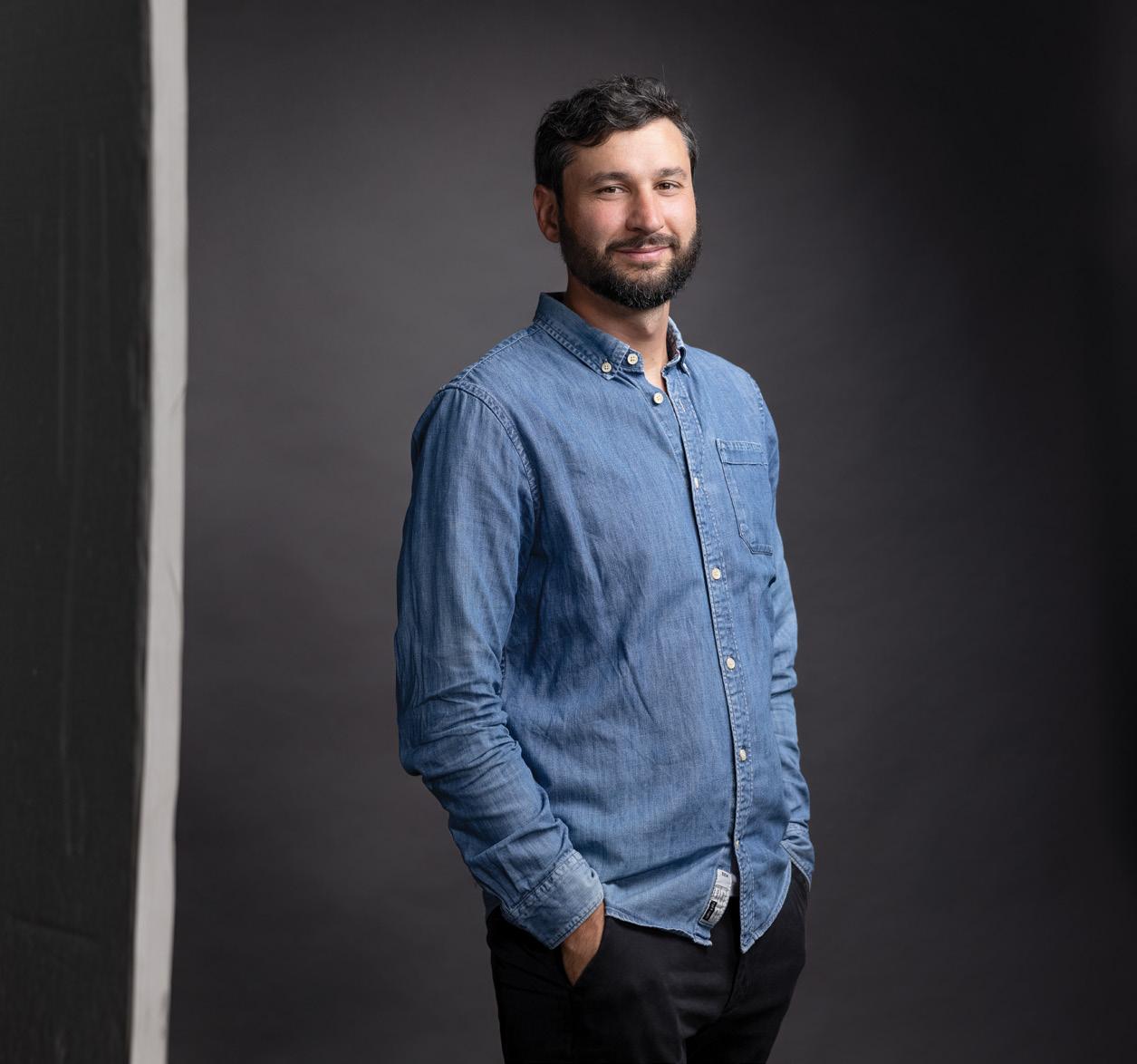
Age:33
General Manager, Ott Historic Rehab, LLC
Tanner Ott may be a young professional, but he sure does love old buildings with lasting legacies.
Tanner, the general manager of Ott Historic Rehab LLC, blends business acumen with a deep appreciation for preservation, converting often-forgotten structures into functional, beautiful spaces that honor their history.
He earned his Bachelor of Business Administration with a nance focus from the University of Minnesota’s Carlson School of Management. Following this, he completed ten historic redevelopment projects in Minnesota before returning to Columbia in 2020, where he has since led four successful downtown revitalizations, including the award-winning restoration of Columbia’s former City Hall, built in 1901.
Tanner’s approach is hands-on: His briefcase is his mobile o ce, and there’s always a shovel and broom in the back of his truck. He’s often spotted within a half-mile radius of downtown — on job sites, solving building issues, meeting with community members, or advocating for smart growth through his roles with the North Village Arts District, e District CID, and Columbia’s Historic Preservation Commission.
His work has earned recognition from Missouri Preservation and Rethos, but Tanner’s drive transcends working on buildings. He’s also passionate about addressing homelessness and mental health, working toward a community that’s well-designed and well-supported.
“I want to see our local and state community address mental health and bring healthier lifestyles to people currently living on the streets,” he says.
Resilience is the go-to word for Ashley Minor, the owner and lead planner at Delight Events. You might picture champagne, cake, and stunning ower arrangements when hearing that Ashley is a wedding planner, but the reality, she says, is “far more complex.”
“People see the beauty of the nal event, but it’s the behind-the-scenes strategy, planning, and leadership that bring the magic to life,” she says. “My work is part therapist, part time wizard, part creative director — and always about making people feel seen, celebrated, and stress-free.”
Ashley is focused on empowering women in business and insists that women be kind to themselves. She is serving her second term on the True North board of directors, and she has also coached girls’ basketball at Rock Bridge High School, in addition to serving as women’s director for Columbia KLIFE for three years and leading worship at e Crossing Church for seven years.
She credits where she is today to resilience, faith, and the examples set by people who shaped her early on, especially her grandfather, Larry Gross.
“I lost both of my parents when I was 11. at loss forced me to grow up quickly, but it also gave me a di erent lens for life,” Ashley says. “I learned that nothing is guaranteed, and the only way forward is through.” Her grandfather was also her greatest role model.
“He taught me by example: work hard, serve others, and show up with integrity no matter the circumstances,” she says. “His advice shaped everything I’ve done.”

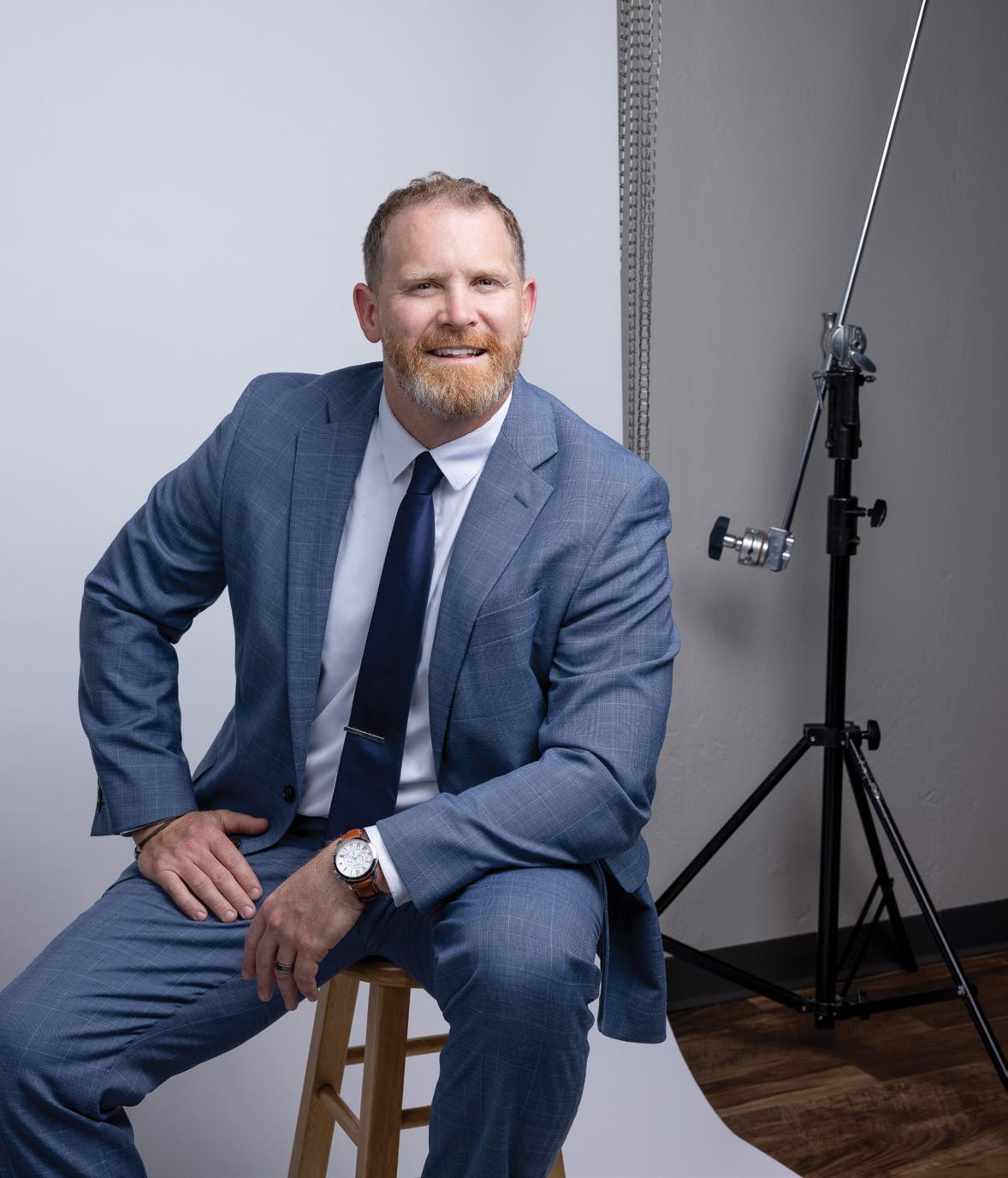
Even at the height of the COVID-19 pandemic, Taylor Drennan, principal at John Warner Middle School, didn’t let anything stand in the way of his passion for community education.
In 2020, he helped lead the opening of the school, working with sta and students to build something entirely new. With more than a decade in education and a deep-rooted family history of teaching, Taylor brought the experience and steady leadership needed to guide the community through such an unprecedented time.
“I grew up witnessing the impact my parents had on students and the community,” he says. “Even now, former students still thank them. at kind of lasting legacy is what I strive for.”
As a middle school principal, Taylor’s role is more multifaceted than most realize. While discipline plays a part, much of his day is spent observing instruction, mentoring teachers, managing operations, and fostering a positive, student-centered culture.
He’s often the rst to arrive — around 6:30 a.m. — and among the last to leave, regularly attending concerts, games, and student events. His leadership is built on visibility, consistency, and connection.
In 2016, Taylor was named Columbia Public Schools' Middle School Teacher of the Year, a recognition of his commitment to excellence and relational leadership. For him, the work doesn’t end at dismissal.
Chief Executive Officer, Boys and Girls Clubs of the Columbia Area
A lot of Columbia businesspeople and nonpro t executives wear many hats — often at the same time — but consider the roles Martina Hoyt-Vail lled in 2024. Not too many people will envy her to-do list.
“I successfully carried the titles of newly appointed CEO for the Boys & Girls Clubs of the Columbia Area, expectant mother, and graduate student simultaneously,” Martina explains. “Each of those experiences was challenging on their own, and I’m proud I was able to successfully manage all three.”
Martina, a rst-generation college student, graduated with honors from Mizzou in May 2024, earning a Master of Public A airs degree, focusing on nonpro t management. Her career has been focused in educational nonpro t work, spending fourteen years as a site manager for Mizzou’s Jumpstart program prior to joining the Boys & Girls Club of the Columbia Area in August 2022.
“Every day is an adventure at the Boys & Girls Club, and no two days are the same,” she says. “But each day reminds me of my ‘why.’ Our kids are our future, and they deserve every ounce of energy poured into meeting their needs.”
Martina knows rsthand the value and bene t of that energy.
“I was blessed to be raised by parents that pushed me to excel academically, encouraged a strong work ethic, and supported me every step of the way — and still do,” she says. Age:40
Caldera
Partner at Harper, Evans, Hilbrenner & Netemeyer
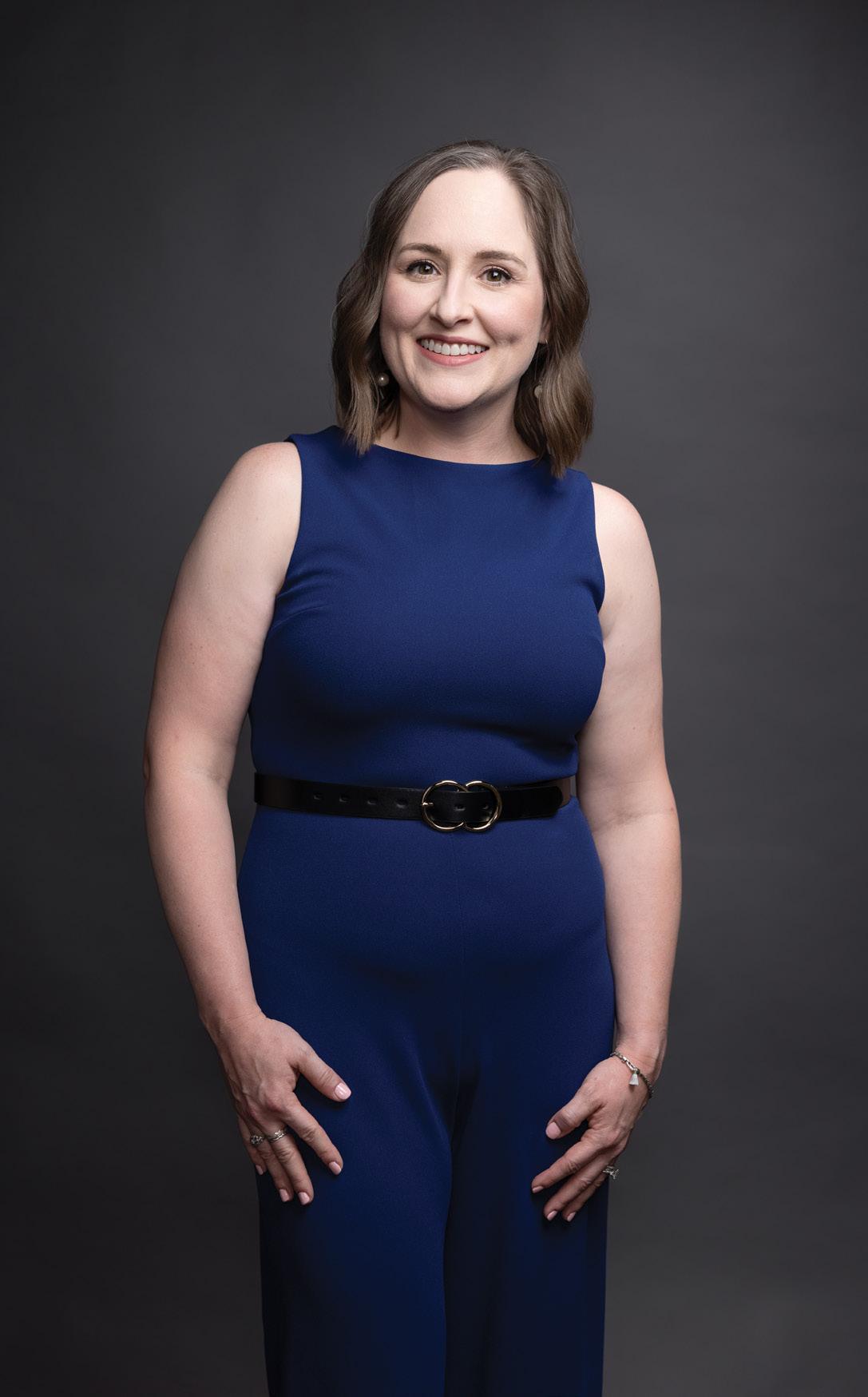

Age: 40*
Jessica Caldera has an undeniable and unapologetic “bring it on” attitude.
As a partner at the law rm of Harper, Evans, Hilbrenner & Netemeyer, she has vast experience as both a prosecutor and a criminal defense attorney.
“I’d love to tell a witness, ‘I was the president of a sorority. If you think you can out-manipulate me, you are wrong,’” she says. But more seriously, Jessica wants to be the go-to criminal defense attorney for Columbia and the surrounding area.
Jessica is a 2003 graduate of Parkway North High School, and she earned a journalism degree from Mizzou, graduating in 2007. She earned her Juris Doctor at Indiana Maurer School of Law.
“I would love to pioneer a restorative justice program in Columbia,” she says. “Too many people believe the system is against them. We often treat issues as all-or-nothing, or purely good versus purely evil. at leads to a vicious cycle in which both victims and defendants (and their families) lose trust in the system.”
In Jessica’s view, a restorative justice program could facilitate dialogue and community engagement.
“More so than a prison sentence or prohibition on hiring felons, we could foster real o ender accountability, address the root causes of crime, and strengthen our community,” she says.
Fun fact: Jessica is only 5-feet, 2-inches tall … but she was an all-conference high jumper in high school.
Anna McDaniel
Manager, Love Coffee – Columbia Post Acute

Growing up in a home as one of six siblings, Anna learned how to be a part of a team, how to be kind to others, and how to work together. Guided by her family and her faith, Anna has been part of Special Olympics since she was 9, and she is a multisport, multimedal-winning athlete. She has twice represented the United States in competition, and more recently she quali ed to compete in the U.S. Special Olympics in pickleball.
Anna, the rst Love Co ee employee to earn promotion to a management position with the company, is also the athlete representative for the Missouri Special Olympics board of directors. She manages Love Coffee’s site at Columbia Post Acute and became the rst Columbia Post Acute volunteer to be hired to assist with patient activities.
Her elevation to a manager position has inspired another Love Co ee employee to train and reach for that promotion as well.
“ ere should be fewer employment barriers and more companies willing to nd ways to let all the people of this incredible city work and participate in local businesses,” says Anna, a 2009 graduate of Rock Bridge High School. “Not hiring a person because of a disability diagnosis is a loss to a company. Given the opportunity, many potential workers can prove that they can be and are an asset to the company that brings them in.”
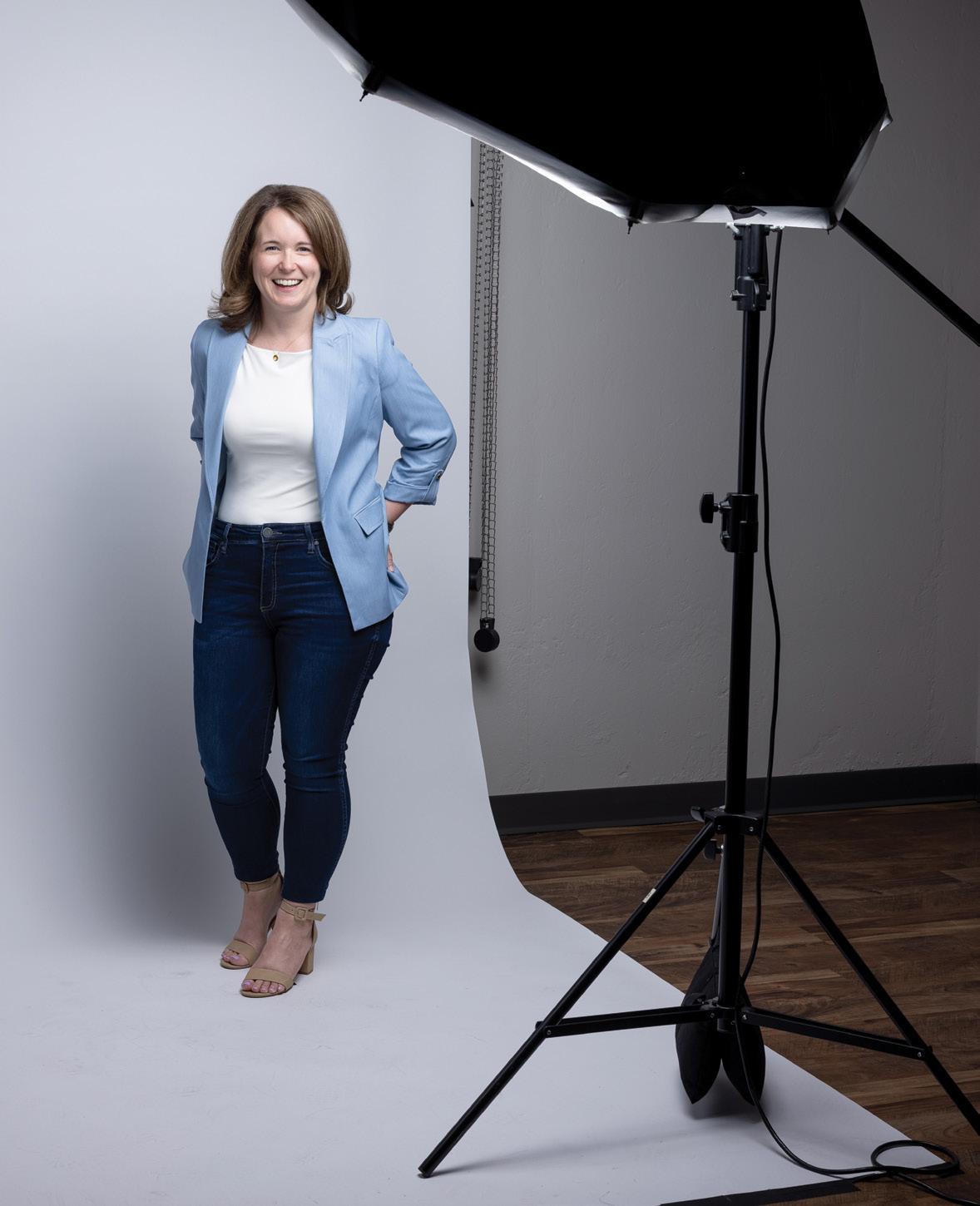
Ellen Young knows what it’s like to stand at a crossroads and to help others through theirs.
At just 20, she became a mom while still a sophomore at Mizzou, a turning point that could have derailed her degree. Instead, it fueled her determination to graduate, earn her master’s, and build a career devoted to guiding others through their own life transitions.
“I have a high sense of responsibility and duty. If something is in my life, even adjacently, I see it as my responsibility to participate or pitch in,” she says. “If people need help, I help. ere have been times in my life when I haven’t been able to help, so when I can, I do.”
Today, Ellen is the assistant director of MizzouMade Career & Professional Development for the Mizzou Alumni Association, connecting Tigers of all ages with tools for success — re ning resumes, preparing for interviews, and building professional networks. She also leads the MizzouMade Business Network, linking nearly 200 alumni-owned businesses through outreach, events, and mentorship.
Her commitment to betterment bleeds into the community, through serving on the Parks & Recreation Commission, chairing the board for Women's Intersport Network (WIN) for Columbia, and supporting youth employment at the Southwest Swim Association.

Creator and Curator, Flynn & Stone
Honoring legacies. Celebrating milestones. Finding comfort during loss. ose missions probably don’t t the stereotype that many of us have for the jewelry business, but they are fuel for Rachel Flynn’s boundless energy and passion as the owner of Betz Jewelers, her family’s fourth-generation jewelry store.
Rachel, the valedictorian of Hickman High School’s Class of 2004, is also the creator of Flynn & Stone jewelry.
“ ere are often happy tears in our showroom,” she says, “and that’s how I know the work we do is meaningful, valuable, and important to the humans we live alongside in this community.”
Since taking on the marketing director’s post at Betz, the store’s business has grown by more than 200 percent, the team has expanded, and community relations are even deeper, Rachel said. And more than the community has taken notice. Betz Jewelers was honored as the Columbia Chamber of Commerce Small Business of the Year in 2024.
Rachel says her children are her biggest motivators.
“ ey inspire me to lead with kindness, work hard, and build something meaningful, not just for myself, but for their future,” she adds. I want them to have the option to continue building a legacy as the fth generation of Betz Jewelers.”
Rachel is a huge fan of Art in the Park, an event that “brings together artists, families, and the entire community in a way that feels joyful, inclusive, and energizing — exactly the kind of atmosphere that makes Columbia such a special place to live.”
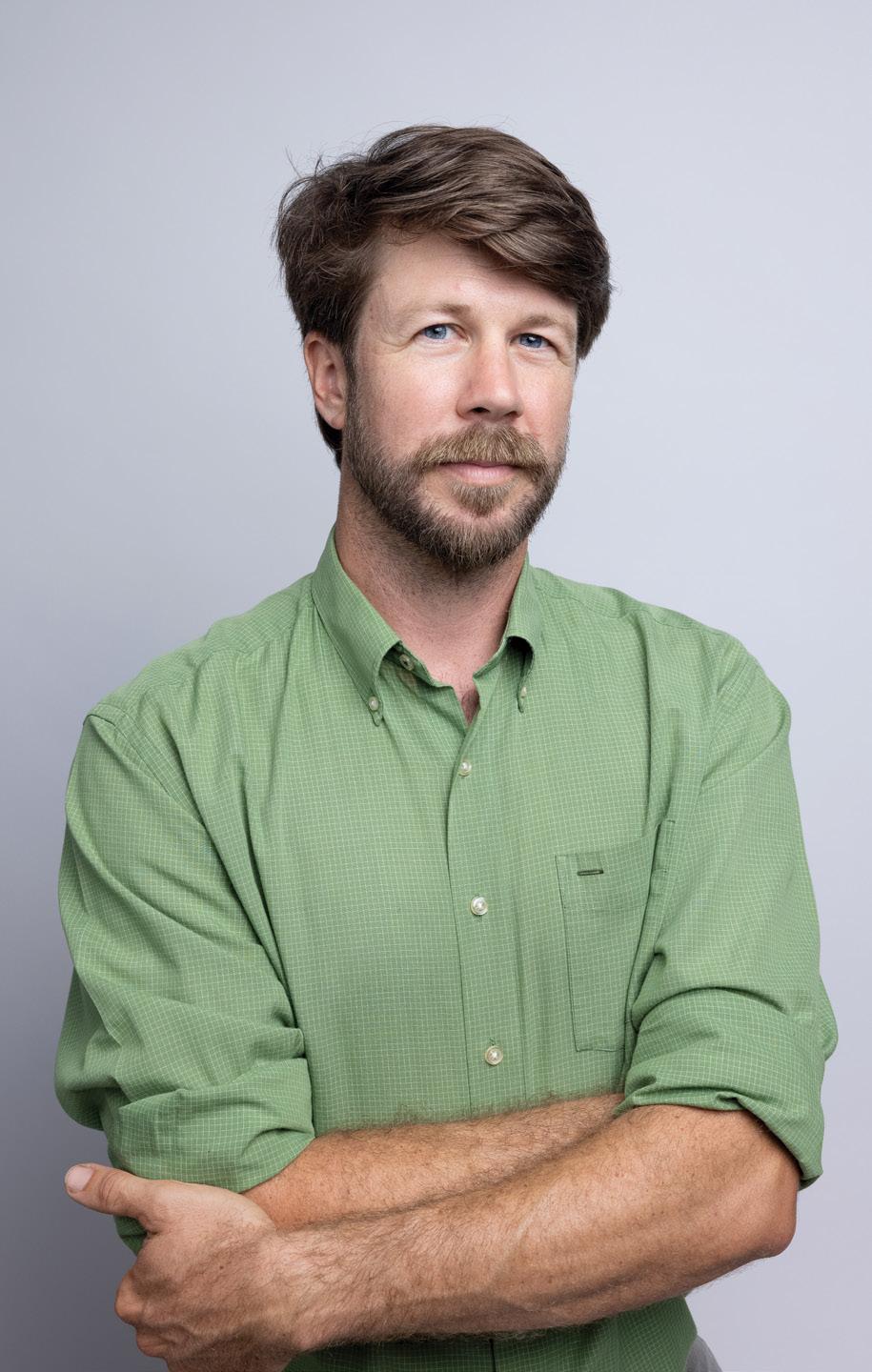
Adam Saunders plants seeds that feed both people and possibility. How about them apples?
Adam is a farmer, builder, and social entrepreneur whose work is deeply rooted in growing community through food, education, and innovation. Adam co-founded the Columbia Center for Urban Agriculture (CCUA) in 2009 and has spent the last 16 years growing it into a thriving nonpro t with over 27 full-time sta , hundreds of volunteers, and a powerful mission: hands-on education in farming, gardening, and cooking.
Serving as campaign director for the Agriculture Park project, Adam has helped raise nearly $12 million from private donors to build a campus that now houses the Columbia Farmers Market and CCUA’s headquarters.
“CCUA has an amazing team of people. We’ve been able to recruit some of the smartest and hardest-working people I know to our sta , board, and volunteers base,” he says. “Further, I’m grateful for all the generous donors who’ve seen the promise of investing in our food system via hands-on education and the food system infrastructure at Columbia’s Agriculture Park.”
When he’s not building partnerships or raising funds, Adam’s growing apples. rough Adam’s Apples, he grafts trees, manages orchards, and helps landowners plant and sell fruit using holistic, sustainable methods. Adam’s schedule may shift with the seasons, but one thing stays constant: his belief that better food systems and stronger communities start from the ground up.

Age:40*
Shareholder and Attorney, Van Matre Law Firm; Co-Owner and Event Organizer, Just Between Friends of Columbia
Whether she’s focused on her “day job” as a shareholder and attorney of the Van Matre Law Firm or her side gig as co-owner and event organizer at Just Between Friends of Columbia, Casey Elliott thrives on nding solutions to problems.
“Creative problem-solving is my forte, and I love to nd ways to get the deal or project done,” she says.
Casey, a “preacher’s kid,” graduated in 2011 with a Juris Doctorate and Master of Business Administration from the University of Missouri. She’s been practicing law since 2011 at Van Matre Law Firm, P.C., and became a shareholder in 2015. In 2017, she and her bestie, Nichole Clark, opened a Just Between Friends (JBF) children’s consignment sale franchise in the community. JBF Columbia is now the area’s largest children’s and maternity consignment sale.
As an attorney, Casey has been named a “Rising Star” by Super Lawyers for eleven out of fourteen years of her practice. At Just Between Friends, she and Nichole won the 2025 Just Between Friends Franchise of the Year Award, up against more than 150 nationwide franchises.
Casey is grateful for the support from her husband, Philip, who is “one hundred percent on board with whatever is next,” she says. Professionally, she gushes about the mentorship of attorney Craig Van Matre.
Ashley Perry knows exactly when someone’s having a terrible day: eir car won’t start, they’re stuck on the side of the road, and they’re not sure what to do next. at’s when they call her team. And for Ashley, that moment of trust is everything.
As president and third-generation operator of Doug Perry Towing, she values the combination of logistical expertise with a deep sense of responsibility and care.
“From keeping customers calm while stranded roadside to managing the logistics of getting their operator to them in a safe and timely manner, my job as a dispatcher is the most important one!” she says.
Ashley, a proud Hickman Kewpie, spent 15 years working at all three Columbia Hy-Vee locations, climbing the management ladder and developing a passion for people- rst service. at foundation, combined with a family legacy and a natural ability to lead through chaos, made her the perfect t to carry her family’s business into a new era.
Since taking the wheel, she’s doubled the company’s call volume through relationship-building, introduced health bene ts for employees, and created a workplace culture where her team feels supported and valued.
ough she honors the legacy passed down to her, Ashley’s eyes are on the road ahead: streamlining operations, enhancing safety training, and continuing to earn the community’s trust.
“He gave me permission to learn from my mistakes, but also the con dence to believe in my abilities,” she says. “For that, I am eternally grateful.” Age:36



Rodney Dixon
Recruiting Manager, EquipmentShare
of Central Missouri
Much like an improv scene, Adam Brietzke’s career has been shaped by saying "Yes, and ..." at might explain why his journey to becoming the marketing and development director for Big Brothers Big Sisters of Central Missouri is anything but ordinary. A 2004 graduate of Rock Bridge High School, Adam earned his Bachelor of Fine Arts in Acting from Missouri State University. He then worked in the lm industry and spent several years managing GameStop stores in Louisiana. When he returned to Columbia in 2016, he discovered his true calling: using storytelling, community building, and creativity to help children access life-changing opportunities.
“Something I feel strongly about now is to always be curious. It’s easy to dismiss people, activities, ideas, and so much more because you think you already know everything. But it’s a more positive experience to assume otherwise and to explore possibilities,” he says, embodying a mantra perfect for someone dedicated to helping children and communities grow. Adam, a longtime theater enthusiast, served as artistic director for Talking Horse Productions from 2018 to 2022 and continues to perform with his improv team, e Ponies. He credits his parents with instilling his work ethic and passion for service and his theater teachers for teaching him to believe in his own voice.

An extraordinary sense of humor — even when it's used in a self-deprecating way — is an attribute that Rodney Dixon seems to possess.
“Most people think I’m a full-blown extrovert, but I’d really consider myself an extroverted introvert,” he says.
A 2011 graduate of Hickman High School, Rodney is the recruiting manager with the talent acquisition team at EquipmentShare. He started his working career as an intern at Central Bank of Boone County while working toward his Bachelor of Business Administration degree at Columbia College. Rodney is named after his grandfather, who also earned a business administration degree from Columbia College.
“My grandfather was a major mentor for me for my entire life,” Rodney says, adding that his grandfather passed away in 2019. “I still live to make my grandfather proud.”
Rodney was named 2014 Employee of the Year at Central Bank of Boone County. He still holds that honor “in high regard.”
“Knowing the caliber of professionals who work at the bank, I am still deeply honored that they would recognize me for such an award so early in my career,” he says.
He later joined EquipmentShare’s community engagement team, where he formed and strengthened partnerships with Columbia Center for Urban Agriculture, Habitat for Humanity, Columbia Public Schools, and many others. Rodney adds, “Working in a position that enabled me to o er support to these critical organizations is truly a highlight of my career.”






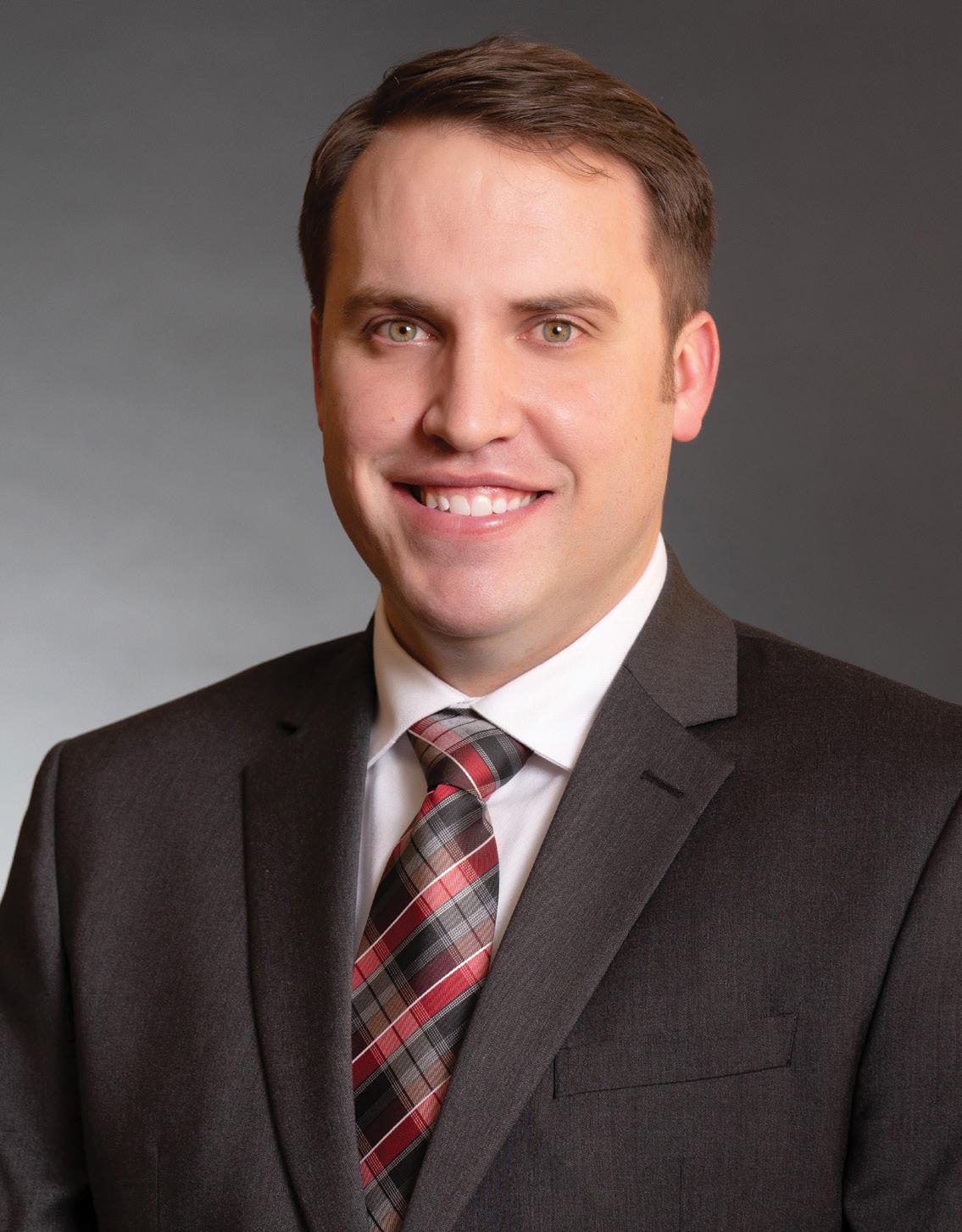
Join us in congratulating Garrett Walker on being named to the 20 Under 40. This honor highlights not only his professional success but also his commitment to our community. Garrett’s dedication to building relationships and engaging in local initiatives truly makes a difference.
We look forward to seeing how he continues to impact our community.
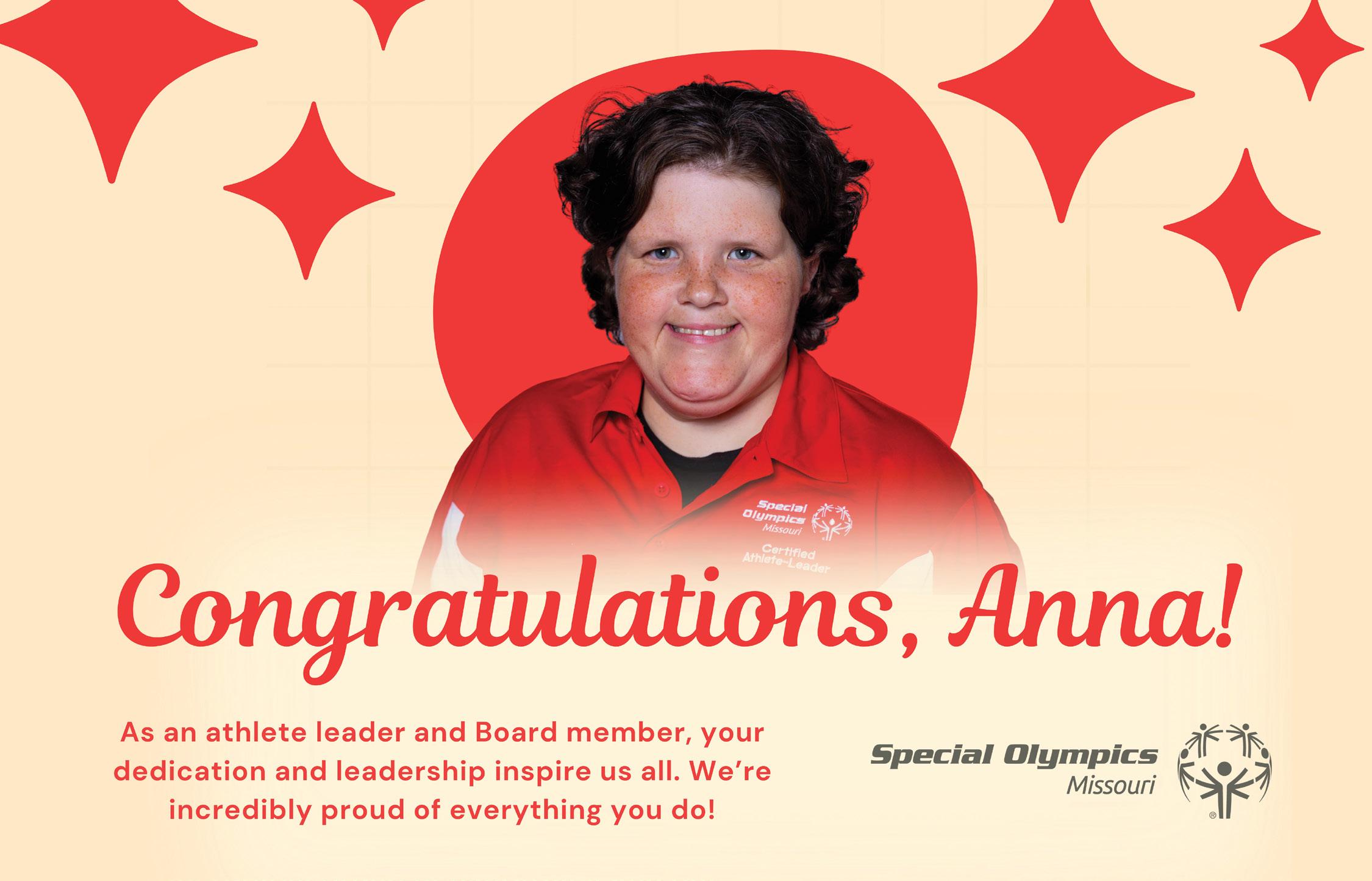



























Columbia College students step out of the classroom for hands-on learning.
BY LAUREN SABLE FREIMAN PHOTOS BY ABIGAIL WADE – COLUMBIA COLLEGE
Asa Columbia College senior majoring in nance, Prisca Akonkwa has spent the past three years inside classrooms, learning from textbooks, case studies, and lectures. is past January, she took the opportunity to gain real-world business experience as a student consultant with Columbia College’s Aspire Business Clinic.
“When you’re working in class, you have presentations for your professor and classmates, but in a business, you have to understand the expectations of the person you are working with, so that was very di erent,” Akonkwa says. “In this program, it pushed me to go deeper than what I learned in school.”
e Aspire Business Clinic o cially kicked o during fall semester of 2024 with the goal of introducing students to the world of business consultancy, says Bob Hohenstein, visiting professor of business administration and the clinic’s director.
“Students today want experiential learning, and they want real-world skills,” Hohenstein says. “ ey don’t want to just be lectured to in a classroom; they want to be prepared to go into the workplace ready to go, and most employers want employees they bring on board to be ready to go on day one.”
As other institutions of higher learning around the country add experiential learning components to their o erings, Hohenstein notes that the concept of a clinic — essentially functioning as an in-house consulting rm — was a practical way to give students the opportunity to put their skills to work in the real world. It also seemed like a natural t for Columbia College.
“After our dean, Dr. Jon Moberly, executed a similar program in his previous position, we felt it was something that needed to take place and that it would be a viable clinic given the number of small businesses in Columbia, both for-pro t and nonpro t,” Hohenstein says. “We began foundational work in the fall of 2024 and began actual work with clients in the spring of 2025.”
ere are three ways that Columbia College students can become a part of the Aspire Business Clinic. e rst is through student employment. Students seeking a part-time position on campus and hoping to work in the clinic go through the same process as any student seeking an on-campus position.
“ ey submit their credentials to the human resources department, have a personal interview, and a decision is made,” Hohenstein says.
e second is through an academic internship. While students are paid for the hours they work, an intern submits work to be reviewed and graded by the college. ey then earn academic credit toward their degree.

Prisca Akonkwa attends an interview tips event.

e third way students come to Aspire is through enrollment in Management 350, a Hohenstein course that is known as “ e Business Clinic.”
“ e course gives students insight into what a business consultant does,” Hohenstein says. “We review what a business consultancy is set up to do, what its goals are, its ambitions, and what you can expect as a business consultant.”
Hohenstein notes that while enrollment in Management 350 is not currently a prerequisite to participation in the Aspire Business Clinic, it could become one at some point in the future.
“ ere is every possibility that it will be a requirement moving forward, so students have the background,” Hohenstein says. “ ey won’t just be walking in not knowing what it is or what our purpose is. e course will give them a better background into what a business consultant does.”
While students can connect to Aspire in three di erent ways, Hohenstein says there is “no limit to the skill level or talent we take.” e clinic accepts students from all disciplines at Columbia College.
“You don’t have to be in business,” says Hohenstein. “We need that extra piece that students may have from nursing, cybersecurity, one of the arts and sciences, biology. We try to be as open as possible as to who we invite to the clinic, and we really want as many students in the clinic as we can that make sense and can bring value to the clinic and our clients.”
Hohenstein notes that the clinic is also open to the types of businesses it works with.
“We want a good blend of for-pro ts and nonpro ts that have a range of problems that they need solved or need help with,” Hohenstein says. “ e goal is to get small businesses within central Missouri, preferably in Columbia or within Boone County.”
Participation in the program is free to businesses.
“Most businesses can’t a ord an apprenticeship program, and there is no charge for the consultancy at all,” Hohenstein says. “We understand that the prospective client is a small business that doesn’t have the resources to pay a consultant, and this clinic can really help a student understand what to expect when they get into the business world. … e purpose of the clinic is not to generate income for the college, but to provide students and businesses an opportunity to work together to provide something that is bene cial for the student and the client.”
After beginning work with the Aspire Business Clinic this past January, Akonkwa says she had the opportunity to work with fellow students as part of two business consultancies for two di erent local clients, a ower shop and a counseling center. While the projects were very di erent, they both allowed her to translate the skills she had been learning in the classroom to a professional environment.
“An internship or working in the real world always brings more skills than you learn in class,” Akonkwa says. “I learned about working in a team, being organized, and I just learned a lot about professionalism, which I don’t really get in class.”

“Students today want experiential learning, and they want real-world skills. They don’t want to just be lectured to in a classroom; they want to be prepared to go into the workplace ready to go, and most employers want employees they bring on board to be ready to go on day one.”
— BOB HOHENSTEIN




At the ower shop, she helped create a budget to match the company’s goals and assessed whether proposed marketing ideas worked within that budget.
“It was also coming up with new ideas because they wanted to expand in other areas,” Akonkwa recalls. “I learned that nance is not just about numbers when you’re working in a business. You need to consider the reality of the business and other businesses in town and consider other aspects like branding and marketing. ey are all important, and you need to look at all of them before coming up with a budget or a nancial analysis.”
As she prepares to graduate in December, Akonkwa has her eye on graduate school.
“After grad school, I’m thinking about going back home to Congo,” Akonkwa says. “I always wanted to have a consulting rm in my home country and help small businesses or businesses that are in rural areas.”
She admits that her rst experience working o campus with a real business was stressful at the beginning, but she has gained so much con dence in her professional skills.
“ is program will help me when I go to grad school because I’ll have a better understanding of all the courses I had,” Akonkwa says. “When I go back to my home country, I will already know how it works and all the things I need to consider when working.”
Aspire has had ve student consultants to date, and Hohenstein is now focused on expanding the program to include both more student consultants and more local clients.
“One of my goals is to grow the Aspire Business Clinic to the point where, hypothetically, we can’t take on any more clients,” Hohenstein says. “Another goal is for this to be a year-round thing because business problems don’t go away in the summertime. You don’t walk out the last day of spring semester and forget about it until the rst day of fall semester.”
e con dence and understanding that come from collaborating with working professionals can’t be overstated, and while the hope is that business owners may eventually become mentors, Hohenstein notes that pushing students outside of their comfort zone is one of the secrets to the clinic’s success.
“ e Aspire Business Clinic puts students in professional environments that may not be very comfortable, where they're dealing with business professionals who are working to put food on the table,” Hohenstein says. “It’s serious business to our clients, and it gets the student out of his or her comfort zone, where they have to dig deeper.” CBT

New community development director, radioisotopes, and Big Whiskey’s.
BY JODIE JACKSON JR
CLINTON SMITH is Columbia’s new Community Development director. e city announced in a news release that Smith will begin his new role on September 29.
Smith has worked in community development for seventeen years, including as the director of Planning and Protective Services for Je erson City since 2023. He was also previously a senior planner for the city of Columbia. Smith received his undergraduate degree from the University of Missouri. He is also a certi ed planner with the American Institute of Certi ed Planners.
Coming Soon: Port 131 Plans Big Whiskey’s
A major retail development near the I-70 and Lake of the Woods interchange will include Big Whiskey’s American Restaurant and Bar, which expects to break ground this fall. e Columbia Daily Tribune reported that at least four other tenants will occupy separate buildings in the development. Big Whiskey’s announced the land acquisition on its website last fall.
e company, which has plans for eight new restaurants, referred to Columbia as “one of the most vibrant college towns in the nation.” Columbia-based Alpha Real Estate and DeLine Holdings are part of the Port 131 partnership.
Burrell opens new clinic and services center Burrell Behavioral Health hosted a grand opening for its new
adult clinic and Intensive Residential Treatment Services (IRTS) center at 1611 Town Drive in Columbia on August 12. Burrell purchased e Town Drive property, formerly home to Rainbow House, to provide residential behavioral health services for adults in mid-Missouri. e IRTS program will serve individuals in care for a period of six months to two years. e center will serve up to sixteen individuals and is expected to create more than twenty new jobs.
Radioisotope Science Center at Discovery Ridge e University of Missouri will establish a center for research, development, and production of radioisotopes using a $20 million grant from the U.S. Department of Energy and a matching $20 million grant from the state. e Radioisotope Science Center will be built at Discovery Ridge. e facility will be 33,500 square feet and is projected for completion in early 2029, according to a news release. MU said the facility will accelerate the research, production, processing, and distribution of critical radioisotopes, which are in short supply and are used for cancer research and treatment.
A new nonpro t thrift store — e Cause Closet — has opened at 806 E. Business Loop. e new venture has committed to helping provide support for survivors of human tra cking through Central Missouri Stop Human Tra cking. According to a post on Nextdoor, e Cause Closet hours are from 9 a.m. to 6 p.m. on Sundays and Mondays.
Congrats to the A-Frame Wine Garden on its 40th anniversary. e scenic venue near Rocheport was celebrated with new and longtime guests on August 16.
Columbia Insurance has earned recognition as a 2024 Employee Experience Top Performer from DecisionWise, a global company that tracks employee engagement. Columbia is one of seven on an elite list of medium-sized companies to receive the award, the company said in a news release.
Her popularity is already stratospheric, and now Columbia’s basketball sweetheart and Indiana Fever “enforcer,” Sophie Cunningham, has started a podcast with fellow Rock Bridge grad and “Summer House” star West Wilson. e “Show Me Something” podcast covers a wide range of topics, including sports, pop culture, and personal experiences, with a focus on un ltered conversations and humor. Pre-press update: Cunningham su ered a season-ending knee injury on August 17. CBT

Street Talk is a monthly overview of “word on the street” business and community news. Street Talk is sponsored by e Bank of Missouri.
Issued July 2025
CEN Missouri, LLC
Medical marijuana manufacturing
Christopher Nelson 1801 Nelwood Drive, Columbia
NuCrown, LLC
EyeCare of Columbia 401 Locust Street, Columbia
Verndalay Industries, LLC
Vernetti’s Italian Grocer 124 E. Nifong, Columbia
SFT Auto Repair LLC
1905 Vandiver Drive, Columbia
Darrell’s Detailing & Hand Washing LLC
1307 N. Seventh St., Columbia
Les Dance Studio
Viktor Valentin Les 3910 Peachtree Drive, Columbia
Birdie’s Como LLC
Birdie’s Deli 1204 Hinkson Avenue, Columbia
Hibbett Retail Inc.
Hibbett Retail Sports #1661
Christie McIntyre 1205 Grindstone Parkway, Columbia
Small Batch Catering LLC
14 E. Business Loop 70, Columbia
Green Leaf Solar
General contractor
Daniel Roe
1406 Lakeview Avenue, Columbia
Magic Nails
Mong Lanh Le
4101 W. Vawter School Rd., Columbia
RD First Class Barber Shop LLC
Starlin Fermin
705 Vandiver Drive, Columbia
CTM Group, Inc.
John Capela 2300 Bernadette Drive, Columbia
Beaver Capital Construction
Ryan Beaver 2005 Limestone Avenue, Columbia
Rodolfo Lopez
Retail trade
705 Vandiver Drive, Columbia
Braids and Locs by Tearria LLC
TeArria Smith 705 Vandiver Drive, Columbia
JoJo’s Biscuit Company #1 LLC
2540 Broadway Blu s Drive, Columbia
Bradley Marketing, Inc.
e Tom Bradley Show
omas Diestel
3610 Buttonwood Drive, Columbia
Panera LLC
Panera Bread #6481
911 Rollins Street, Columbia
T-Mobile Financial, LLC
Retail trade
505 E. Nifong, Columbia
Claudia’s Love AffHair
Claudia Holt
3700 I-70 Drive SW, Columbia
Amen Concrete LLC
John Schanck
705 Vandiver Drive, Columbia
Haircraft Tonsorium, LLC
Megan Stone
416 E. Broadway, Columbia CBT
Issued by the city of Columbia’s Finance Department.


Apartment buildings going up on John Garry Drive, modification at Aurora Organic Dairy.
BY JODIE JACKSON JR
e city of Columbia’s Building and Site Development o ce issued 100 building permits in July, and the Boone County Resource Management o ce issued 75 building permits. Combined, the 175 permits have an aggregate estimated valuation of $32.9 million.
e city’s valuation for its 100 permits was $21.8 million, compared to 130 permits with a $37.6 million valuation in July 2024. e county’s July 2025 total of $11.1 million for building permits compares to 89 permits and a valuation of $11.4 million for July 2024.
Among the highlights of the city’s building permit report includes process line modi cations and a silo addition at AURORA ORGANIC
DAIRY’S plant at 4525 Waco Road
e 2,500-square-foot project listed a valuation of $174,350. e general contractor is Big-D Construction Corporation of Salt Lake City, Utah. Subcontractors include Questec Constructors Inc. and Meyer Electric Company, both of Columbia.
ree multifamily apartment complexes got the green light for development o John Garry Drive.
LAKESHORE APARTMENTS AT CORPORATE LAKE will have three twelve-plex, three-story housing apartment buildings with parking. e general contractor is Garry Lewis Properties.
e apartments will be built at 4808 and 4806 John Garry Drive (both at 18,481 square feet, $2.6 million valuation) and 4810 John
Garry Drive (15,283 square feet, $2.11 million). Local subcontractors and engineering rms are Johnson Plumbing, Crocket Engineering Consultants, Engineering Surveys & Services, and Malicoat-Winslow Engineers, Inc.
e rapidly developing area of State Farm Parkway and Stellar Drive will be the home of LIFESTANCE
HEALTH , an outpatient behavioral health services provider. e building at 4500 Stellar Drive, Suite 104, is getting various alterations and modi cations of existing mechanical, plumbing, and electrical systems. e building permit listed BGS Construction of Lone Jack, Missouri, as the general contractor for the 4,084-square-foot, $157,606 project.
e city’s July 2025 building permit report breakdown includes:
• Addition, residential: 2 permits, $364,200
• Alteration, commercial: 8 permits, $1.35 million
• Alteration, residential: 10 permits, $313,675
• Pool (1 & 2 family): 1 permit, $36,316
• Commercial multi-family: 3 permits, $7.31 million
• Commercial new: 1 permit, $25,000

• Deck only: 11 permits, $191,691
• Reroof: 35 permits, $554,558
• Single family detached: 25 permits, $11.56 million
• Solar photovoltaic system (residential): 4 permits, $76,350
Other highlights of the building permit report include:
Commercial alterations at the CHURCH OF CHRIST at 1729 W. Broadway, Suite 10B. e permit covers 6,620 square feet for interior
If you see a building popping up and wonder, “What’s going up?”, email jodie@comocompanies.com and let us know!

Kyle Pfister of FastSigns installs a new sign at 400 E. Walnut St., Suite 108 , for the city of COLUMBIA TRAINING CENTER
The site will host new employee orientation and similar training. Previously, the city's human resources department held training and onboarding at the HR building at Broadway and Sixth.
Photo by Jodie Jackson Jr
renovation to an existing tenant suite for use of a church. Hercon Construction Inc., Tracey Herigon, is the contractor for the $400,000 project.
A BOB M c COSH building at 3300 Range Line Street is getting a new roof and new siding, replacement of interior wiring, and replacement of ceiling-hung furnaces. e permit summary stated that the building will be used for unmanned storage space. e project has a valuation of $500,000, according to the building
permit, which did not list the general contractor.
Interior renovation of an existing UPS STORE at 2000 E. Broadway will not change the building’s use. e 1,142-square-foot project listed a valuation of $75,000. e building is owned by GKT Eastgate Columbia LLC. e general contractor is Vanmeter Construction LLC of Overland Park, Kansas.
Single-family home building permits in July include a 9,744-square-foot, $1.05 MILLION home on Lightpost Drive in e Gates development at Old Hawthorne at the top end of the cost spectrum. APM Construction Services, LLC is the general contractor. Meanwhile, Hemme Construction is the contractor for a $212,485 home in the Amberton Place development o Bosco Bel Drive
e Boone County July building permit breakdown includes:
• Single family residential: 17 permits, $7.59 million
• School/educational building: 1 permit, $75,000
• Other nonresidential: 9 permits, $1.89 million
• Other structures: 4 permits, $240,024
• Residential additions/alterations: 16 permits, $622,999
• Nonresidential: 2 permits, $193,000
• Residential garages: 7 permits, $425,400
• Miscellaneous: 19 permits, $26,300 CBT
195
Record-setting total number of nominations received for this year's class of 20 Under 40. The 20 Under 40 Class of 2025 will be feted on October 8 at The Blue Note.
2021
The year Gina Overshiner started her vegan food truck, Gina’s Vegan A Go Go.
100
The number of building permits issued by the city of Columbia in July.
$8 00,000
The amount in federal funding cut from various programs at the Columbia-Boone County Department of Public Health and Human Services.
$375,000
The median price of a single-family home in Columbia in June.
$40 million
Using a $20 million grant from the U.S. Department of Energy and a matching $20 million grant from the state, Mizzou will build the Radioisotope Science Center at Discovery Ridge.
10 Hitt Street
It’s where you find the best vibes for vinyl, movies, and baked treats at Hitt Records, Ragtag Cinema, and Uprise Bakery.

THE SHOW-ME CAREERS PROGRAM is making a powerful impact in the Columbia region by bridging the gap between education and the workforce. A program of the Columbia Chamber Foundation and the Columbia Chamber of Commerce’s Workforce Division, in partnership with the Missouri Chamber of Commerce and Industry, the initiative connects education with in-demand career opportunities through immersive, hands-on experiences with local employers.
During a ve-day stint in June, the program welcomed its largest cohort yet — eighty-two educators from Columbia Public Schools and across Boone County. e middle and high school teachers, counselors, and administrators spent the week deeply engaged with the region’s key industries, gaining real-world exposure to high-demand elds experiencing worker shortages. Since launching in 2022 with just twenty Columbia Public Schools educators, the Show-Me Careers program has grown signi cantly, re ecting strong regional demand and the clear value of connecting classrooms with careers. In just three years, participation has quadrupled, amplifying the program’s reach and impact throughout the education system. e weeklong experience allowed participants to explore a wide range of career pathways by visiting employers such as REDI (Regional Economic Development Inc.), Boone Electric Cooperative, Questec, MACC (Moberly Area Community College), Solventum, Reinhart Construction, Emery Sapp & Sons, Veterans United, and MU Health Care.
Scan the QR code to learn how educators are bridging classrooms and careers to prepare students for in-demand jobs.
BY STEVE SPELLMAN
OUT OF THE BLUE, I recently shared with several closer acquaintances the fact that I attended a City Council meeting. e usual reply they shot back was, “Why?”
Not as in, “Oh, good for you, concerned locals should do this regularly, so what was your speci c motivation toward good citizenship?” But rather, “Um … why?” Or, “Why in the WORLD would you do such a thing?” or, “Why torture yourself?” is universal response came from everyday citizens, a few business leaders, and even a former city o cial. It was often accompanied by stunned perplexity, a wrinkled brow, and/or a mocking gu aw.
After attending one council meeting this spring, I stayed afterward to chat with the attendees, and one sitting council member asked why I had come. Was I planning to run for City Council? Oh, gosh, please don’t start that rumor!
at does seem to be a thing, by the way. is spring, both Ward 2 special election candidates started the habit of attending the meetings. Vera Elwood sat toward the back, taking notes fast, while Ken Rice would pop up to the public comment podium and talk fast.
I had historically heard second- and thirdhand how it’s tough to get approval from our municipal government to build a house or to use a house in the way one might reasonably see t.
But attending a couple of City Council meetings gave yours truly a nearly front-row seat to the dramas of two real-life people trying to accomplish just that, and a hard time that process sure does seem to be.
One professional engineer was presenting on a new green eld housing development on the northeast end of town. He told the council that, based on prior complaints from nearby neighbors about how new two-story homes could peek down on their existing houses, he relented and made his proposed dwellings one story and placed them on smaller lots. A nearby resident went up to the mic and said that now she didn’t like that these people’s patios would be so close to her back fence. Darned if ya do, darned if ya don’t.
After some discussion, the council approved these new houses to be built in this town. I followed the developer out the front door and thanked/congratulated him for putting up with all that. He grinned and shrugged, which I took as: “Yeah, it’s a thing.”
“Why would anyone go to a council meeting?” The answer might surprise you. Scan the QR code read Spellman's take. CBT